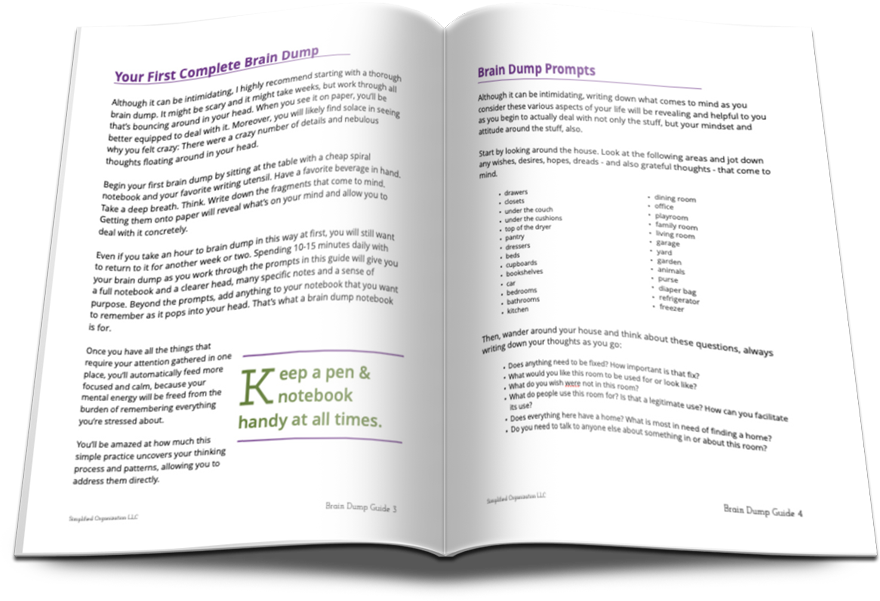
When I was a young wife and mother, I read all the organization books, the productivity books, the godly family living books. I learned a lot, and a lot of it was good.
But it took me about 10 years of trying to put it into practice that I finally realized I was never going to achieve what I had assumed I would achieve if I learned the right habits (ha – and did them all the time – ha) and set up my house and housekeeping systematically.
After a few months of existential crisis (almost entirely in my own head because I am an introverted intuitive), arguing about why this made it all pointless (i.e. when I was 12, I was 12 in my parents’ face; when I was 30, I was 12 in God’s face). God is good and patient (much more than I am with 12-year-olds in my face).
When I finally bent the knee and said, “Ok, fine. If this is really the way you’ve set it up, I’ll go with it. I’m just missing something that you’ve got figured out and I don’t. I’ll just do the work and never achieve anything by it if that’s your plan.”
Guess what? After repentance (even resigned baby-step repentance with mustard-seed-sized faith at a point when I ought to have had a loaded fruitful tree), comes rejoicing.
Giving up our own ideas of what we’re doing, what we’re about, what we’re achieving is often the first step to seeing real organization.

Organization begins in the heart, having a heart rightly ordered to our Creator and Lord.
We imagine that once we get our act together and completely organize and systematize our routines and our home, then it will all be easy. We seek that holy grail – organization – believing that having attained the quest, our lives will then have purpose, meaning, and ease.
We are weary, frantic, pestered, distracted, fatigued, and confused. Organization seems to be the answer to our problems. So we try and try and try, but we just can’t seem to get to the blessed state.
News flash: Not getting there is a mercy and grace from God. Idols will never satisfy, never solve our scattered souls. The reason we are weary and frantic and pestered is not because of our situation, but because of our hearts. And only God can change our hearts.
The blessed state is the state of repentance and obedience, from which rejoicing and gratitude flow.
The siren call of organization is that if we just get our act together, then we can make our life go our way, we can make our life easy on ourselves, we can be control. It’s a lie. Real, true, God-honoring organization is being always ready to serve as needed.
Being always ready is first an attitude, a mindset, a heart thing and secondarily a preparedness with the material resources we use in service.
So let’s find 52 ways to cultivate an organized attitude in our lives.
Table of contents
- 1. Choose a growth mindset.
- 2. Keep realistic expectations.
- 3. Change the story.
- 4. Meditate on truth.
- 5. Pause to pray.
- 6. Know your vocations.
- 7. Give yourself a motto.
- 8. Iterate your plans.
- 9. Smile.
- 10. Embrace 15 minutes.
- 11. Keep in fellowship.
- 12. Create an island of sanity.
- 13. Own your thoughts.
- 14. Know that life will change.
- 15. Accept entropy.
- 16. Roll with the punches.
- 17. Everything Has A Place.
- 18. Be impervious.
- 19. Kiss your husband.
- 20. Blaze the trail.
- 21. Make your bed.
- 22. Write a daily note.
- 23. Get steps.
- 24. Sing a song.
- 25. Get sleep.
- 26. Drink water.
- 27. Find accountability.
- 28. Say thank you.
- 29. Get dressed.
- 30. Have a menu plan.
- 31. Eat breakfast.
- 32. Make something.
- 33. Ignore the mess.
- 34. Hug your children.
- 35. Go to church.
- 36. Go to the doctor.
- 37. Purge a closet.
- 38. Laugh.
- 39. Build your house.
- 40. Have a good cry.
- 41. Read a novel.
- 42. Have a grocery route.
- 43. Wear an apron.
- 44. Take a photo.
- 45. Organize your purse.
- 46. Share the load.
- 47. Fill your mind.
- 48. Take a break.
- 49. Eat intentionally.
- 50. Develop grit.
- 51. Cultivate friendships.
- 52. Declutter your head.
- So, why organize your attitude?
1. Choose a growth mindset.
An organized attitude is a growth-oriented attitude.

An attitude that perceives life from the lens of growth rather than mere failure or success makes us
- resilient
- open
- grateful
When we see the circumstances God sends our way as opportunities to grow, then we do not have to fear, we do not have to get angry, we do not have to panic.
Instead, we hunker down and see that we are being given the opportunity to practice this or that fruit of the Spirit and pray for it to be granted us. We see our need and get the grace that will see us through.
Choosing a growth mindset is sanctification, not self-help. We are to grow in godliness, and so if we can see our inconveniences, set-backs, and failures as providentially sent for our good, for our growth, we will be able to work through them with faith and not wallow in them in fear.
A growth mindset sees the yogurt spilled all over the floor – the homemade yogurt that took 24 hours to make – as a call to prize the child over our efforts by not taking him down for it but helping him clean it up instead. It’s not about my yogurt, it’s about what and who I love.
The good news is that when we practice acting out the right choice in such everyday situations, it will slowly change our internal responses. Even if, at first, we regret the yogurt more than we regret yelling at the child, if we obey and put things right and choose the right thing, our hearts will be changed.
Before organized closets, we need to accept our roles and duties.
2. Keep realistic expectations.
When we make a to-do list full of our own pet projects when our time is actually taken up with our children and their needs, we’re going to be grumpy and feel our children are getting in the way. Instead, we need to put them on our to-do lists and make sure we meet their needs before we add more in.
When we think that we can keep the house neat and clean while we’re pregnant and homeschooling, we’re setting ourselves up for frustration on top of our exhaustion.
When we think we can leave the house in under five minutes when we have five children who rarely know where their socks and shoes and coats are, we make ourselves late and rushed.
What to do?
Learn from experience.
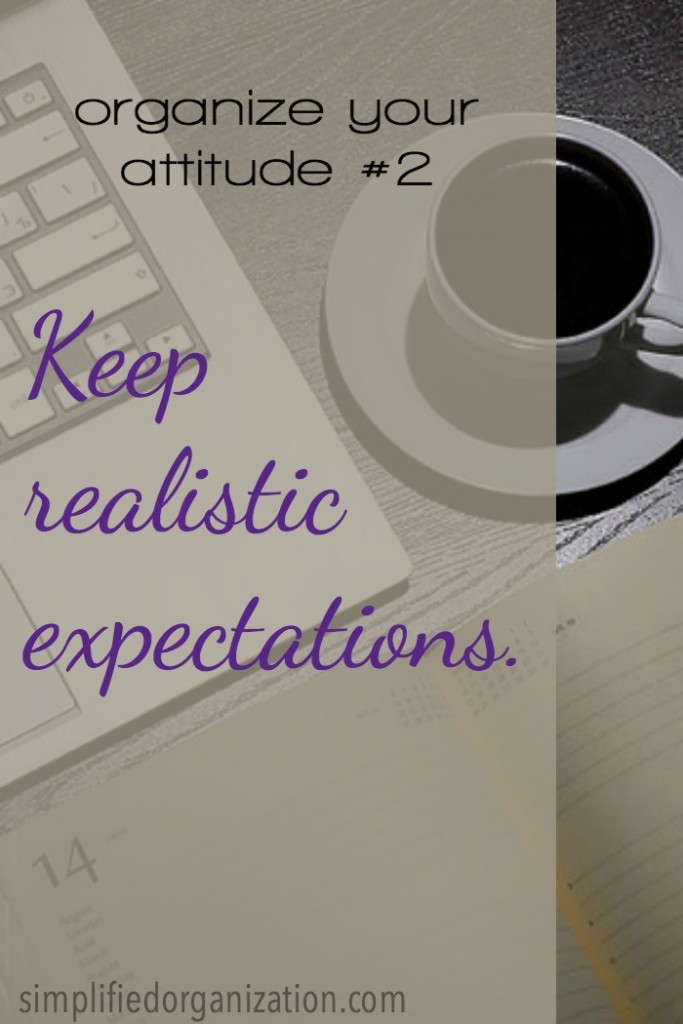
We only know what expectations are realistic when we evaluate our reality.
We have to take that time to look back over that day we were at the end of our rope. What made us feel that way? What could we have done differently? How can we set things up to circumvent the frustration and prepare for what’s most likely to happen?
Perspective is gained only when we take that time to notice and think. Then we can change our plans and our expectations to fit our current circumstances and realities.
Take time for an evening review. Take time for a brain dump.
What will matter most by the end of the day?
Write that down on your list, no matter how silly or insignificant it sounds.
Living life well is not about checking off as many tasks as possible. It’s about knowing and doing the right things.
We can only know what those things are if we pause often and reflect.
Taking time outs to think it through is not wasted time, but profound time. Without it we simply march on through life, doing the most urgent or the most attractive or the most convenient task. However, with pauses for perspective, we gain clarity and peace, even when we don’t have time to follow up on our plan.
With a better idea of where we are and what our purpose is, we make better intuitive in-the-moment choices, even when we can’t open up our planner.
3. Change the story.
What we think matters.
While it’s still awkward and uncomfortable, we accept the story God is telling in our lives and tell it to ourselves. We can take the reins and “take every thought captive.” We can change our thoughts.
And by changing our thoughts, we can change the story we see ourselves acting.
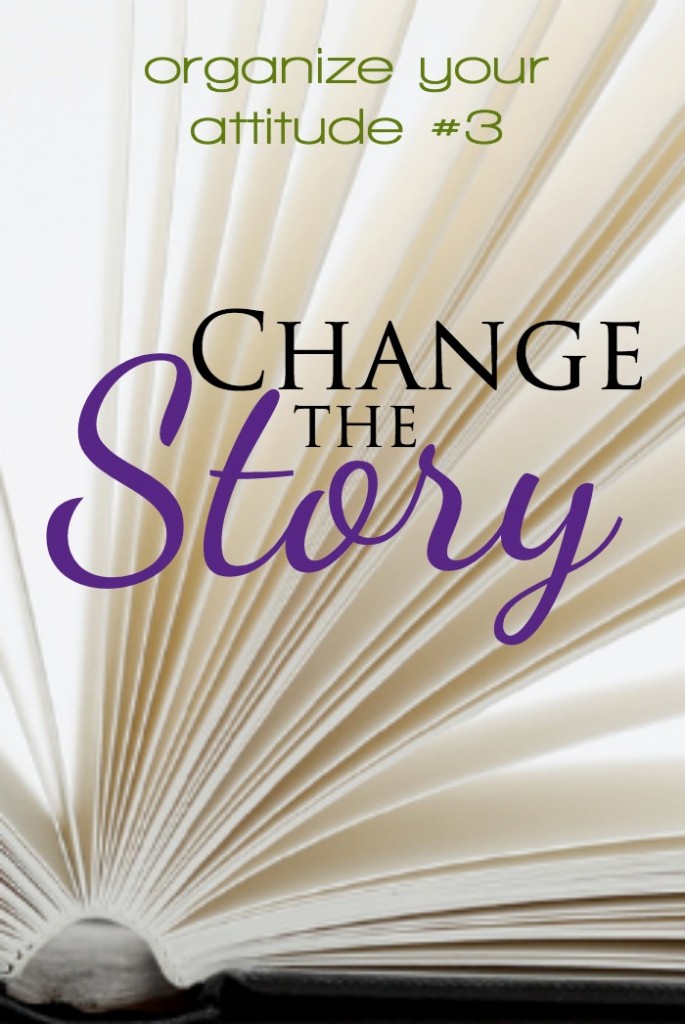
Our racing thoughts include an interpretation of what is happening to us.
What is happening?
What does it mean?
It’s difficult but essential to notice that our perception of what’s going on is an interpretation, a story overlaid on the bare facts. Stripping the story away entirely so that we are unconnected, stoic observers of our lives is not desirable, but we also do not have to be stuck with the story that first and naturally pops into our minds.
If the story we see ourselves living out is one where everyone is against us, where nothing ever works out for us, where kids are a pain and a hassle and a nuissance – then we must notice it and reject it. That is not the story God tells, and it is the story He is telling that is true and that brings peace and comfort, even when the difficult circumstances don’t lift.
God is giving us opportunities to practice and thereby grow in patience, kindness, and self-control.
God is setting apart and sanctifying a people for Himself, and we have the privilege not only of being a part of that people, but of being instruments in discipling the people in our charge, as well. It’s not about us. It’s about His work in the world – which we both are and can be a part of.
What role am I playing right now in that story?
But we can’t simply see that our story is self-pity or pride or whatever wrong-headed interpretation we’re stuck in. We can’t scrape it back to bare facts and stay there.
Rather, while it’s still awkward and uncomfortable, we accept the story God is telling in our lives and tell it to ourselves. What is true? Tell yourself the truth.
To do this, we must know the truth. That means we must know our Bibles and spend time in the Word. Prayer and Scripture reading is how we put off our old man, our old stories, and put on the new.
4. Meditate on truth.
Meditation is rather hip right now, but the kind of meditation I am speaking of is not emptying our minds, but rather filling them.
The Psalms speak of meditation, and in the New Testament we are exhorted to meditate on what is good and true and upright and beautiful. Think on these things.
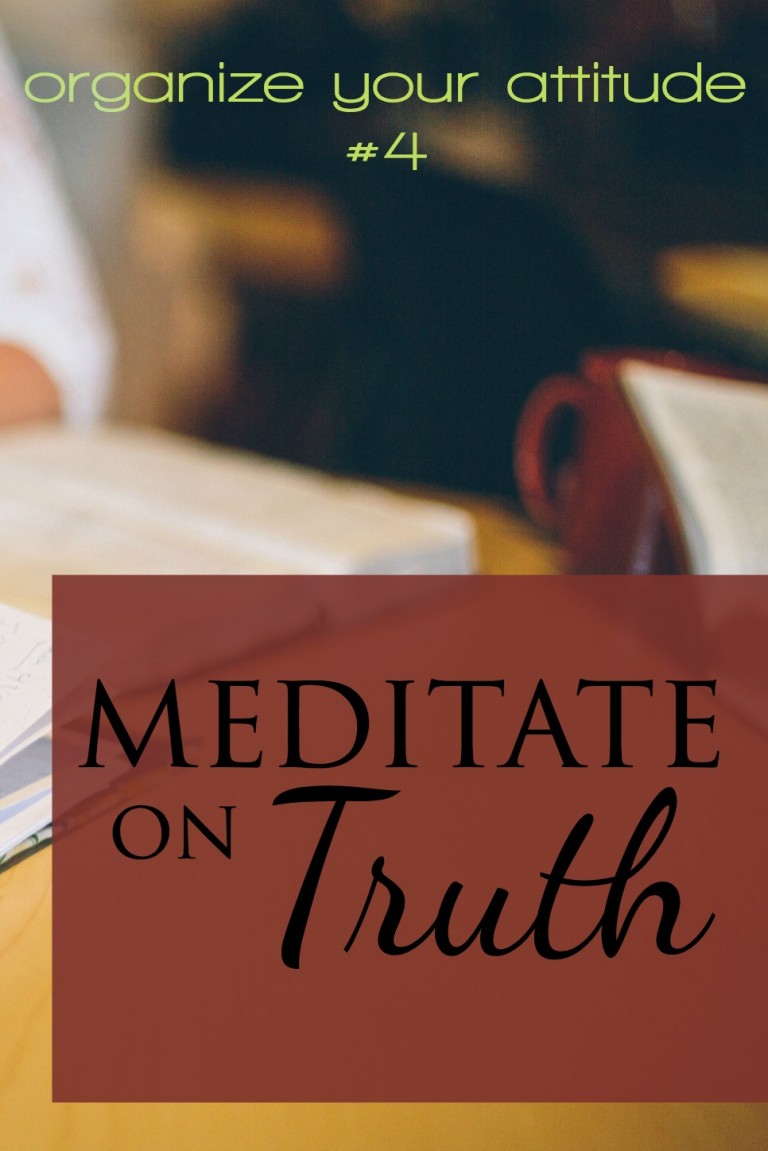
We are thus commanded with good reason: it is good for us. It is good for our attitudes. It is how we keep a proper perspective and align our judgement.
In order to meditate on truth, we have to know truth. We have to be filling our minds with truth.
Daily Bible reading and prayer are essential to an aligned and vibrant attitude. Without it, we are tossed on the winds of our emotions. We need the centering and stabilizing of God’s Word for our hearts and minds.
But we also need bite-sized truths to meditate, not just general reading. To meditate means to deliberate over, to ponder, to consider, to mull over. We can’t really mull over chapters upon chapters at a time. We need to give ourselves little segments to sink down deep, little bit by little bit. Over a lifetime, it creates a deep well.
Here are some ways meditation might fit into our lives at home:
- Morning devotions
- Evening devotions
- Scripture memory work with kids
- Thinking while taking a walk
- Copying Scripture onto a daily index card
By weaving habits of reading, speaking, and thinking about Scripture into our day, we can maintain a resilient and centered attitude.
5. Pause to pray.
The advice to begin our days with prayer is often heard, and rightly so. We need grace and clarity to face our duties with faith, love, and patience.
We do well to heed that advice.
But prayer is also something we can weave into everything we do, as 1 Thessalonians tells us, “pray without ceasing.”
The Heidelberg Catechism asks a question I think we’ve all felt, whether or not we’ve said it out loud:
Why do Christians need to pray?
Their answer, a summary of biblical teaching on prayer, is concise and convicting:
Because prayer is the most important part of the thankfulness God requires of us.
And also because God gives His Holy Spirit only to those who pray continually and groan inwardly, asking God for these gifts and thanking Him for them.
(emphases mine)
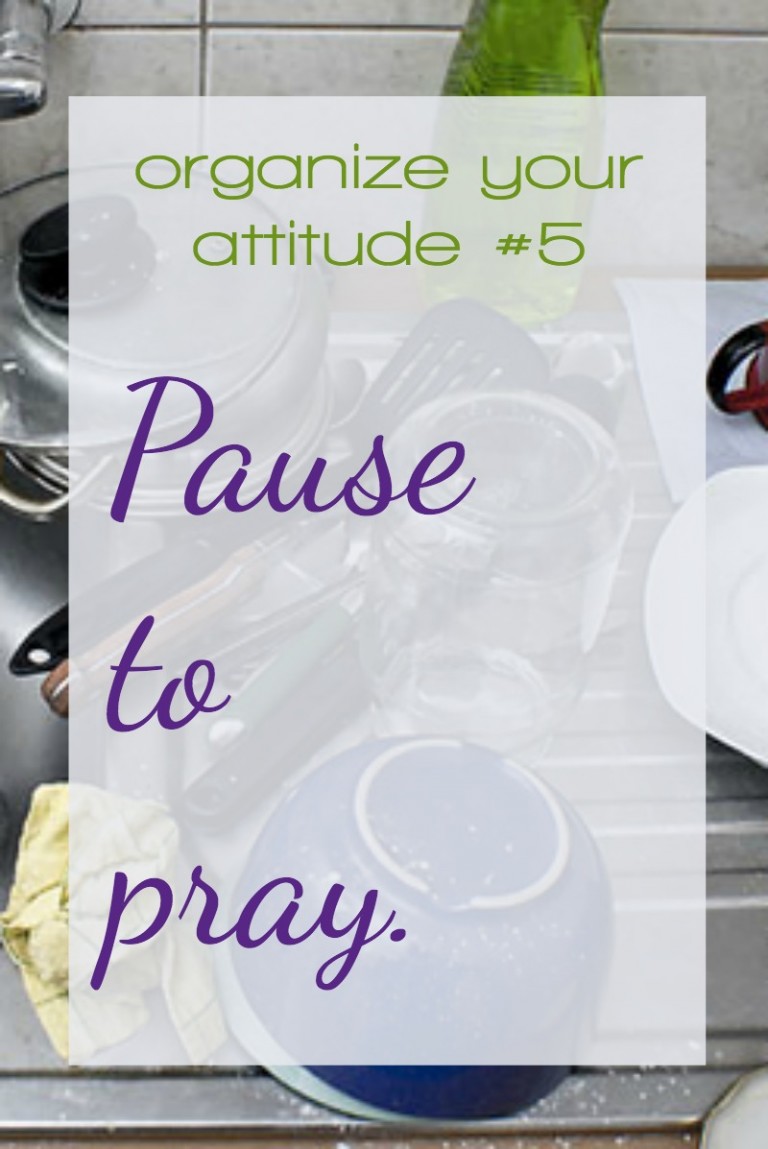
Pray with thankfulness.
Thankfulness comes up twice in this short answer because it comes up so much more in Scripture. We are told to pray with thankfulness even when we’re making petitions:
Do not be anxious about anything, but in everything by prayer and supplication with thanksgiving let your requests be made known to God. And the peace of God, which surpasses all understanding, will guard your hearts and your minds in Christ Jesus.
The promised peace is for those who request with thanksgiving.
Anxiety and worry are attitudes we need to rid ourselves of. Peace and joy (among others) are the fruits of the Holy Spirit, the attitudes of Christ we are to put on. God’s peace, by the Holy Spirit, guards our hearts, changes our attitudes, when we pray with thanksgiving.
Having peace and joy is not something we must do on our own before we present our requests, but something we ask for with thanksgiving and in the moment – all the moments, the many moments – we need it.
Once before everyone is up doesn’t cut it – ask me how I know.
Rather, we are to thank God for the moment He’s given us, even if it contains spilled milk or folded laundry knocked over or more dirty dishes. His goal is our sanctification, not a perfectly orderly home where no one ever steps out of line (our lines, thankyouverymuch).
We feel messed with because we need our lines messed with so we can grow in grace and patience and kindness and turn over our own will and accept His.
For that, we can thank Him.
But so often when we do pray, we pray not asking for the grace to handle our situation the way God would want us to, but we pray that the cross be removed from us utterly. It’s understandable. Christ prayed that prayer, also. But the answer was no.
If we want the answer to be yes, then we must pray that God will give us love, joy, peace, patience, kindness, goodness, gentleness, faithfulness, and self-control – because that’s what He’s trying to work in us, and we’ll be asking according to His will.
Then buckle up, because we’ll be given situations where we’ll have to actually practice those attitudes and responses. And we realize, “Now, Lord, when I said I wanted patience, what I actually meant was that I wanted you to remove the need for patience from my life.” He knows. And He knows better what you need. We can trust Him, thank Him, and grab the grace He sends.
6. Know your vocations.
If there’s one thing that derails our attitudes, it’s feeling overwhelmed and uncertain about what we should actually be doing.
There are so many options, so many opportunities. We simply must say no at times, but how can we know when we should say no and when we need to be stretched by saying yes?
The answer lies in our vocations.
Vocation literally means calling. It is much more than a job, although it includes your jobs. They are statements of the primary roles you play in life.
We each have ways of functioning that fit us, as persons. Our vocations are made up of the big responsibilities we’re given.
God has called us to particular good works, and He has not called us to do every good work. Taking time to clarify our vocations is an exercise that helps us discern those things God is calling us to so we can release the guilt of not doing the good works He’s called others to do.
For we are His workmanship, created in Christ Jesus for good works, which God prepared beforehand, that we should walk in them. –Ephesians 2:10

To call our roles vocations is to remind ourselves that we do not determine our own mission or our own destiny. We don’t need a mission statement so much as we need to sit back and notice how God has gifted us and what God has given us.
Has He created you as a person and called you His child? That is a vocation.
Has He given you a husband and children? That is a vocation.
Has He given you roles in people’s lives or skills that serve the church or the community? That mightbe a vocation, or it might be a distraction or temptation.
What we are called to in one season of our life will not necessarily be what we are called to for our whole life.
It takes wisdom, prayer, and discussion with our husband and a good friend to determine what should be on our plates right now.
The first step in working that out and having categories and filters to run opportunities through is finding and naming your vocations.
I created a free guide to help you do just that. It is only the beginning of the discussion, but it is an essential beginning.
7. Give yourself a motto.
A motto is a short saying that helps you stay focused and committed. Having little mottos will make it easier for you remember to do what you want to do.
Some of my mottos include
- Work the plan. Roll with the punches. Choose the right next thing.
- Uses est magister optimus. (Practice is the best teacher.)
- Come what may, time and the hour run through the roughest day. (Shakespeare)
- Prayer is the most important part of the thankfulness God requires of us. (from the Heidelberg Catechism)
- Leave it better than you found it.
- Smile and start.
These little chants I can tell myself are mini pep talks on the tip of my tongue that can help bring back my attitude when it starts drifting into dismay or laziness.
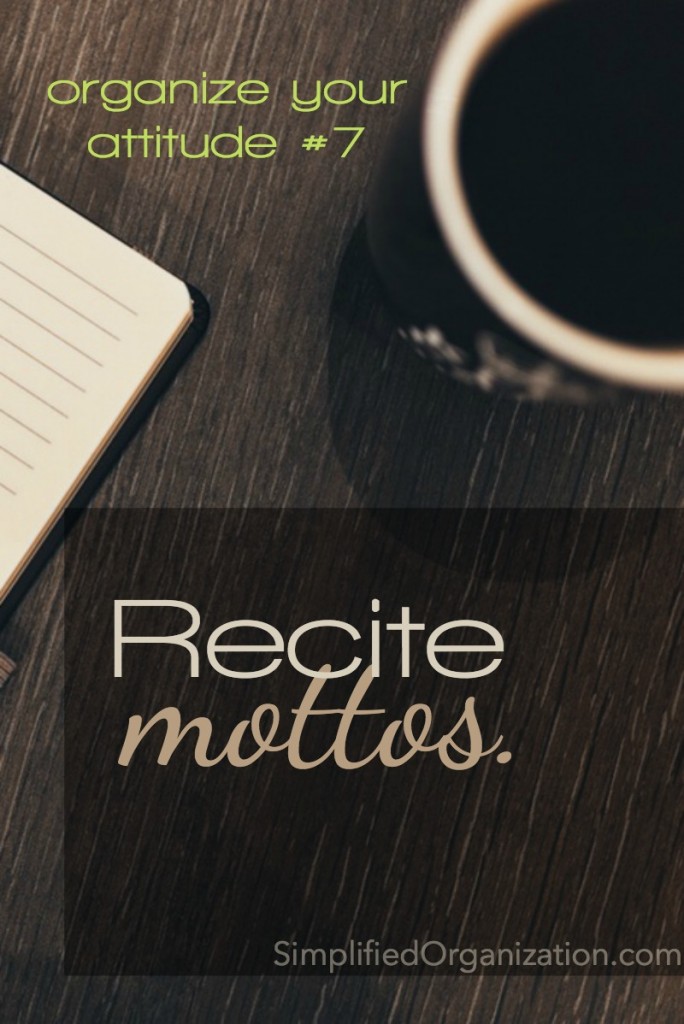
In my own life I have noticed three benefits that selecting a handful of mottos has given me.
1. They provide mental shortcuts.
Instead of reviewing an entire plan of action or running down a list of specific habits, these mottos remind me of the mindset and habit patterns I want to cultivate. The more I say them, the quicker they pop to mind when I need them.
2. They’re catchy.
Mottos are reminders, and they are also catchy. It’s important that reminders be, well, easy to remember. Catchy mottos are inherently compelling and motivating. When they pop into our head, they make us smile, which makes it easier to conform to them rather than fight and argue internally with a more dour, data-driven reminder.
Mottos keep our pep-talks upbeat.
3. They build an identity.
When we recite a handful of mottos over and over again, and conform our choices to them, we more and more naturally live them out even when we don’t use them. They become the way we simply do things.
The best way to form new habits is to take on the identity as the kind of person who … leaves places better than they were, smiles and starts, or doesn’t let a mistake or slip-up stop continual practice.
8. Iterate your plans.
It’s paralyzed us all.
We wait to start moving forward with our plans because we aren’t sure if we’re doing it right. We aren’t sure they will work. We aren’t sure we like the colors we picked.
We pull back and reformat the page or change the app we’re using. We make the list over again to ensure we didn’t miss anything.
We spend more time planning than doing the plan.
That’s perfectionism, and iterating is the solution.
To iterate means to perform repeatedly, to repeat a procedure, applying the result of the previous application to the next.
It’s technically a math term, but it applies beautifully to our busy lives at home which are so full of details and needs.

Don’t wait until the plan is perfect.
Just start with what you have, where you are.
Reserve time every week and every interval for evaluation, but in the midst of the day, just move forward with what you know. The perfect plan is not going to be as helpful as the plan you have in front of you, put into practice.
The day-to-day is for execution mode.
Planning mode is easier, it is less risky and messy. It can be a form of retreat, of hiding from obligation and responsibility.
Dive in, each day, to the responsibilities in front of you.
A plan will help. A better plan will help more. But doing an imperfect or partial plan will be better than scrapping or adjusting your plan.
Instead of being in constant planning mode, reserve times for it. Then, when you are supposed to be adjusting your plan, you have some actually data and feedback to work with.
You know where your sticking points were.
You have a better idea how your life intersects with your plan.
And the plan that you make after that reflection will be much better, more applicable, more individual, because you spent some time “trying out” an imperfect plan rather than waiting until you had everything ironed out.
9. Smile.
Every time you smile at someone, it is an action of love, a gift to that person, a beautiful thing. –Mother Theresa
It’s easy to smile at our newborns, smile at a cute three-year-old antic, smile at our bigger kids when they volunteer to help out. It’s good our life as mother provides us these opportunities to smile, because smiling is good for us and it is good for our kids.

Smiling comes naturally to some and less easily to others, but it is a simple gesture that can steer us clear of self-pity and a downward spiral and an act that is contagious to our children. They will catch and mimic what we model, so we should be conscious of our expressions.
Consciously choose the emotions you display, and the outward act of the will can work its way inward to change your actual emotion.
As Gretchen Rubin writes in Happiness Project:
Random smiling is an example of my resolution to “act the way I want to feel:” while people suppose that feelings inspire actions, in fact, actions also inspire feelings. So by acting happier, I should feel happier. And you know, I think I do.
If we find ourselves in need of a little attitude organization, one simple step we can take is to heave a deep sigh and reoxygenate, then smile.
Facial expressions don’t merely reflect emotions, they also influence emotions. In “facial feedback,” studies show, the mere act of smiling makes people happier — even when they smile mechanically. – Gretchen Rubin
When to smile:
- Smile when the milk spills, because the child now has an opportunity to learn how to clean up after making a mess. No real harm done, but much good can be learned.
- Smile when a child enters the room. Let him know, without words, deep in his bones, that he pleases you.
- Smile when your plans don’t work out. Turns out God had a different idea. Trust it’s a better one.
- Smile when the laundry pile overflows. Perhaps it’s an opportunity to catch up on your podcasts.
- Smile when traffic is slow. Maybe this is the chance you wanted to have a conversation with your pint-sized travel partner.
We can learn the habit of letting small inconveniences and trivial trials roll off our back, and by doing so our resilience and fortitude will be trained should a lasting or larger affliction come.
Smiling disarms the stress that so easily mounts. Stress is bad for our health, for our minds, for our kids. The only way to reject the stress response is to acknowledge we are not in control, but our God is, and we trust Him. In that we can always find a smile of gratitude.
A smile is a simple way to love someone else, to offer approval, acceptance, and affection. It is a gift to your children that gives back to you, also.
It’s simple. It’s effective.
10. Embrace 15 minutes.
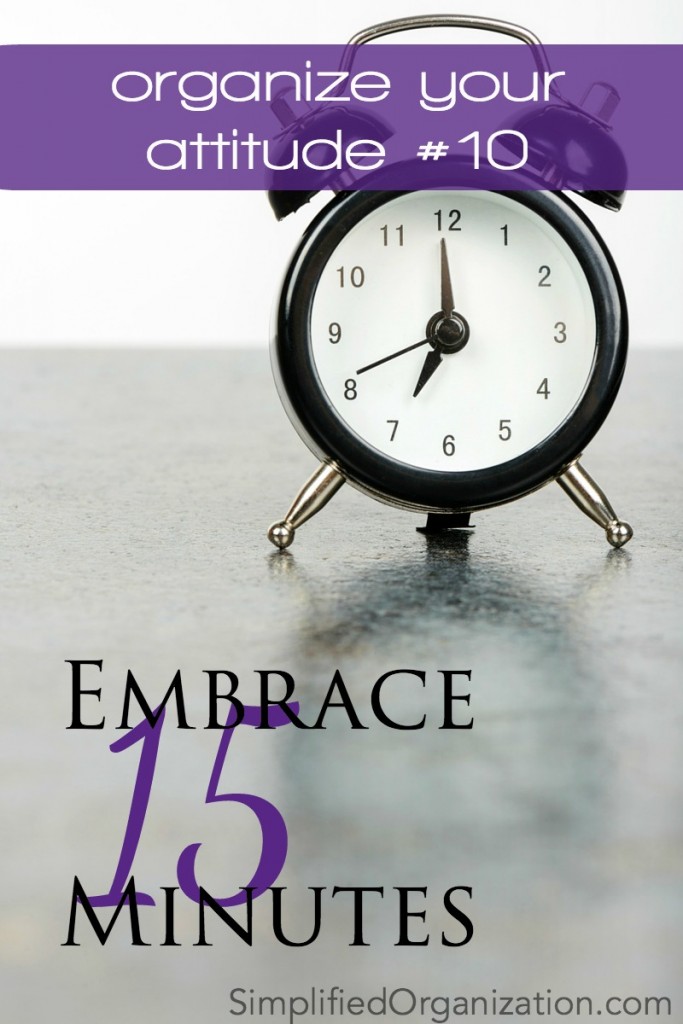
One way we give in to perfectionism is to not start unless we know we can finish and get the results we want.
But as busy moms, that is rarely possible.
We can’t put things off until the perfect moment, because that moment will not come.
Instead, try embracing 15 minute chunks.
I like results and outcomes, but progress is more important and more achievable.
In fifteen minutes you can make progress.
Cleaning and organizing the entire house might be your project, but that’s not going to happen in one day.
However, if you set aside 15 minutes every day (or most days, anyway), you can slowly but steadily move toward that object.
Embrace the process, the incremental change that you move forward, more than the outcome.
Keep a list of small tasks that truly help out that take 15 minutes or less.
Mine includes cleaning out my purse, reordering the utensil drawer in the kitchen, and folding a load of laundry.
It’s good to remember that the job that seems daunting can be over shortly if we just start.
If the overwhelming job on your plate will take longer than 15 minutes, try breaking it up into chunks that are doable within a quarter hour. Is the entire kitchen a wreck? Split it into 5 zones and only tackle one at a time until you’re done.
Seeing small wins snowballs into satisfying success.
In fifteen minutes you can reset your attitude.
Whether it’s by taking a little time out (even if it’s behind a locked bathroom door), drinking a big glass of ice water, or walking up and down the driveway a few times while you pray to sort things out – knowing that your mood is not you and you can let it go is crucial and doesn’t have to take long, doesn’t have to take chocolate (though it helps), and doesn’t have to be dramatic.
God is in the business of changing hearts.
We can ask Him and He will do it, but we must be ready to actually repent and choose and act in love & joy.
Little drops add up over time. All or nothing is not the best approach to anything.
Consistency and building one brick at a time will make solid progress, whether it’s in habits of mood or habits of housecleaning. We will never reach perfection where we no longer need 15 minute boosts. Our house will never stay organized and our moods will never be perfectly tranquil.
But each time we require 15 minutes, we can take it and make progress.
11. Keep in fellowship.
Too often, when we start making goals around keeping house better or getting more done, our focus shifts too far and we start seeing these means as ends – which means anything that gets in the way of our ends is a problem to be overcome or a frustration to bear resentfully.
And too often, that means grumbling against our husbands or shouting at our kids. We could reach our goals, we think to ourselves, if it weren’t for these other people getting in the way.
It’s an insidious bitterness and falsehood that we must be diligent to root out whenever it rears its ugly head.
That’s what it is to organize our attitude.
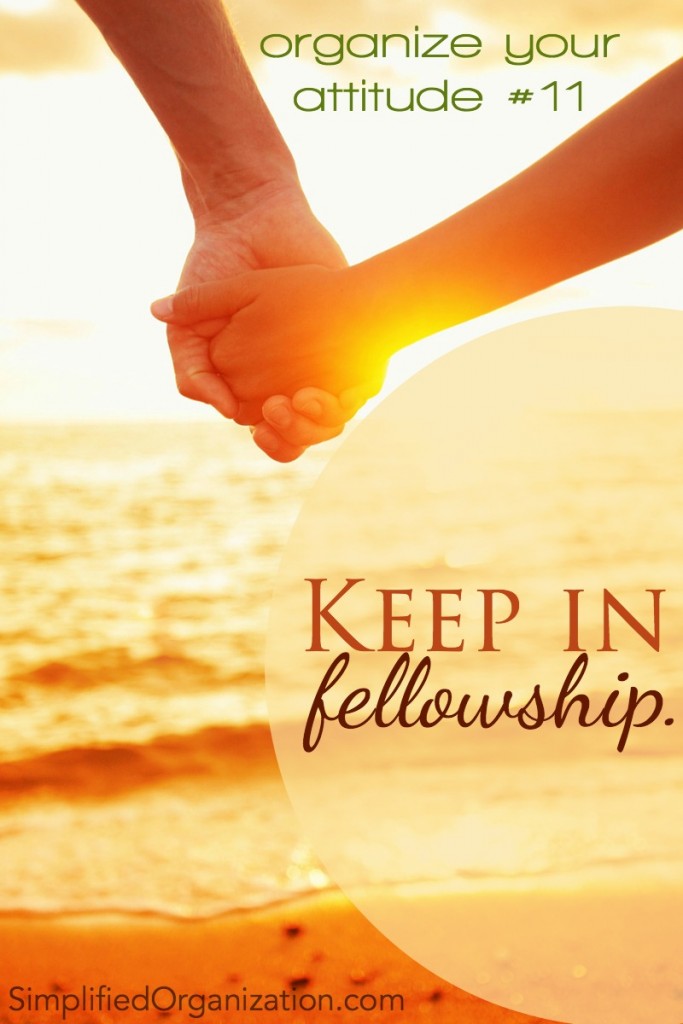
Keeping house or completing other projects are always means, never ends in themselves. They are ways that we serve others and tools we use to bless others. When we become cranky and angry as we work, it is not a sign that we need to repent of our work, but that we need to repent of our attitude.
And God not only forgives, but grants us a new mind, a changed heart, and an opportunity to forgive and serve in the same way He has forgiven and served.
Keep in fellowship with your husband.
Does it feel like you are your husband’s maid? Do you sigh and mutter when you find socks or wrappers or belongings lying right where you just tidied?
You take it personally, but you know he is not aware of it.
Will you listen to your feelings or will you respond with love, kindness, and patience? These are fruit of the Spirit you don’t have to gin up on your own. Just ask for them and practice them.
You have two options:
- Talk to him about how you see the house. Go into a room or setting that’s driving you crazy and ask him how he sees it. Try to see it through his eyes. Without anger or resentment, explain how you see it. Perhaps even hearing it out loud will cause you to see your own unreasonableness. I know it has for me. Talk about what bugs him, what bugs you, and create a plan together to help each other out.
- Let love cover it. Love covers a multitude of sins. If it can do that, it can also cover a multitude of annoyances – that is, your own sins as well as his. Keep no record of wrongs, much less a record of petty irritations.
Organize your attitude by talking it out or by letting it go. Don’t let it fester.
Keep in fellowship with your kids.
It’s easy to feel like the kids are little walking undo buttons.
But the state of the house is not so important as the state of the children’s minds and hearts. How we respond to them, how we talk to them, how we treat them builds their identity in their own minds. Are we building up or tearing down?
Let us commit to modeling joyful work for them.
Let us commit to ranking them above our own goals or chores.
Let us commit to asking their forgiveness whenever we speak harshly or unkindly to them. They need that model of repentance as much as they need kindness, so as long as you set it right, a momentary lapse be for their good as well.
Keep in fellowship with God.
Before we can be right with our husbands or our children, we must be right with God. We must be working not for our own good, for our own reputation, or for our own self-importance, but because it is the work He has placed before us. We do it for His glory alone. We offer it to Him to be used at His discretion – and that might be for the children to undo or for a flood to overwhelm or for unexpected visitors to enjoy. We don’t know, but we can be ready to respond in gratitude, knowing He has His purposes and they are better than our own.
Jesus told us the requirement for fruitfulness:
Abide in me, and I in you. As the branch cannot bear fruit by itself, unless it abides in the vine, neither can you, unless you abide in me. – John 15:4
And how do we abide in Him? Oh, He told us that, too:
So Jesus said to the Jews who had believed him, “If you abide in my word, you are truly my disciples. – John 8:31
A clean and organized house is of secondary importance to our primary relationships.
The home atmosphere is one tool for cultivating relationship, it is not a priority over them and should not be pitted against them.
12. Create an island of sanity.
It’s pretty much inevitable. With a busy, active family, the stuff will quickly move from their designated homes and fill the clear horizontal spaces.
How can we handle this in the middle of an average day while keeping our calm and still caring about how we keep our homes?
We must remember that the point of organizing is not so everything is neat and tidy and clear all the time. The point is that we are ready to do the right next thing; that we are maintaining an atmosphere of love and order in our home; and that our environment supports not only our work, but also the work of our children – the work of learning and growing and thriving.
That work is messy.
Enter: the island of sanity.
To help maintain your calm equilibrium in the midst of the chaotic, messy day-to-day, designate one small area as your own personal island of sanity.
When you don’t know where to start, start here.
So often, there’s so much out and so much clutter and so much to do that we don’t even know where to start.
When you have chosen an island of sanity, you always know where to start. And starting is always the hardest part.
Knowing where to start helps you get going and build momentum. Knowing where to start helps you build your habits and appreciate a clear space – even one clear space in the midst of chaotic clutter.
Build the habit of keeping it clear.
When I was learning to care about cleanliness and neatness, choosing one island of sanity and appreciating this one small spot in a sea of “need to do” around the house helped me so much.
It gave me a small win.
It gave me hope that the order would spread.
It gave me a small area to conquer, so I could build out from there.
When you feel like you’re going crazy looking at all that needs to be done, start with your island of sanity.
Claiming a space as an island of sanity gives you a manageable chunk to do when you feel like looking at everything that could be done will drive you up a wall.
Instead of thinking over and over again about everything that should be done, just start doing – start by clearing your island of sanity.
Instead of yelling at everyone to take care of their stuff, start with your own stuff on your island of sanity and move everyone else’s stuff to some other horizontal spot for them to deal with at EHAP.
Instead of wallowing in vague overwhelm, roll up your sleeves and simply tackle your island of sanity. Just doing a small, visibly effective task will help you calm down and get some perspective. It really will become a spot that reminds you that you can be calm, cool, and collected, even in the sea of bustling activity – just like this one small segment of counter can be clear in the sea of stuff.
Having one small area to tend consistently helps us let go of the desire to control and claim all the horizontal spaces in our home. It helps us take control of our own attitude first and foremost.
13. Own your thoughts.
Change the subject in your head when you need to.
When fear or doubt creeps in, we don’t need to reason with it or explain it away or answer it. We can simply pray about the issue that’s vexing us and then “change the subject” we’re thinking about.
We don’t have to engage fear or doubt and overcome them with willpower or logic. The response of faith is to pray, then turn it over into God’s hands and move on with whatever small obedience is in front of us.
This requires trust and it is also the practice of trusting. Not only knowing our worrying doesn’t do any good, but also acting on that knowledge by doing whatever it is we’re supposed to be doing instead.
Changing the subject doesn’t have to be super-spiritual. You can choose to think instead about what you’ll plant in your garden, about a book you’re reading, about a funny story of the kids’ antics you’ll tell your husband or mother.
Own your thoughts: Set your mind on things above, where Christ is.
The call in Philippians to set ours minds on things above is active. It’s a conscious, purposeful sort of thing, a thing that might feel weird and awkward at first. We’re to pick up our thoughts, as it were, from the trash heap where they want to dig and dwell, and set them where they should be: on Christ, on His kingdom, on love.
By faith, we have a good story. We’re living a good story because God’s writing it. We need to also tell ourselves The Good Story as we walk along our way – this is for God’s glory, not our own; this is about my salvation and sanctification, not about my pet goals.
Remembering the bigger picture puts our grievances and worries in perspective and helps us choose obedience instead of fear or pride. Remember the ultimate outcome and that you are a partaker of it.
14. Know that life will change.
Too often we go into a manic planning or organizing fit, thinking that if we just get on top of it now, we’ll be on top of it once and for all.
A “once and for all” attitude to organizing, cleaning, or planning is bound to disappoint. Nothing in this life is once and for all.
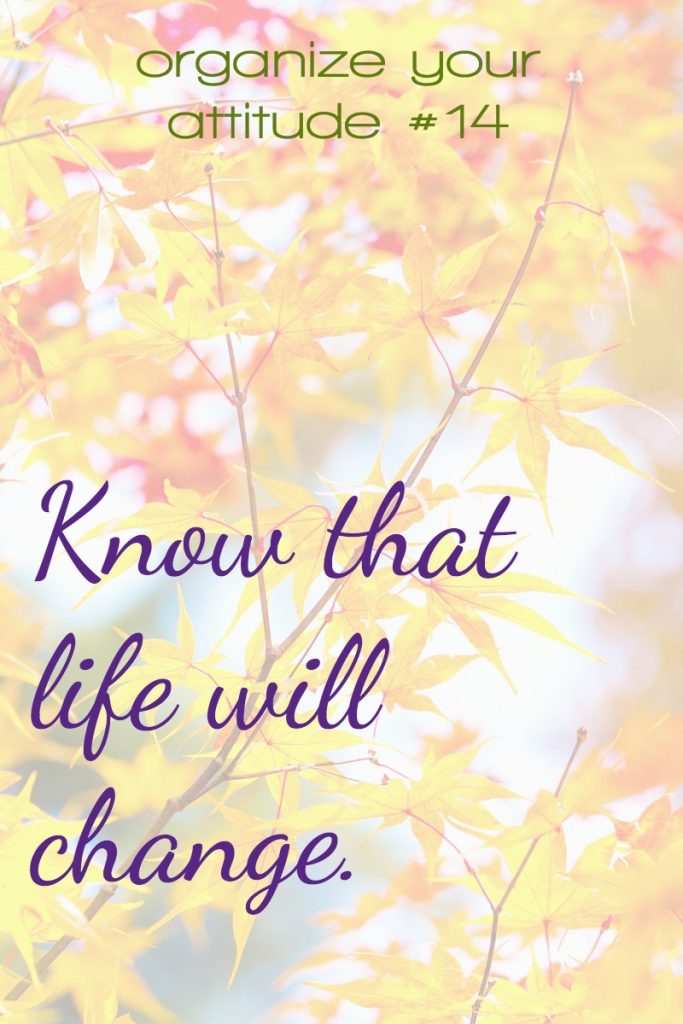
Life goes through different phases, stages, and seasons. Nothing we do will change that. Instead, what we do should work with that reality.
Planning and organizing while knowing that life will change and shift and our efforts will not last forever (or maybe even that long) will look different.
Life will change, so adjust expectations accordingly.
Perhaps it seems like if you start out knowing your efforts are only temporary and not going to last, you’ll start discouraged and think it’s not worth the time you’re investing.
However, it could also have the opposite effect.
Life will change, so work in planned iterations.
Perhaps, if you know you’ll need to reorganize that closet or revamp the chore system or redo the routines, you’ll be freed to let go of perfectionism and just start. The stakes aren’t high. Something is better than nothing and you don’t have to keep this system or set of routines forever.
The more often you start, the easier it becomes to rebuild or readjust the next time. You can start now, knowing you’ll get a shot at redoing it again. It can get better each time.
15. Accept entropy.
Do you, dear reader, know entropy?
We all experience it in every aspect of life. It is the muscles that weaken when not exercised, the dust that accumulates on the shelves, the clutter that seems to spawn in every corner.
Entropy is real. Entropy is part of the current natural order. The dictionary defines it as, “a gradual decline into disorder.”
That’s real life.
Gardens grow weeds.
If we want to handle life well, we have to align our mindset and our actions with that reality.

Organization will always be ongoing.
Organization is not a once-and-done sort of thing. Especially when there are growing children and changing responsibilities, stuff of all sorts is always being generated and needing to be dealt with.
- Cleaning is ongoing: Dirt materializes. Cleaning everything once, no matter how thoroughly, is never cleaning it for all time. Do you have time and energy built in to clean the inevitable effects of entropy?
- Organizing is ongoing: Stuff accumulates. Putting things in their right place will need to be done regularly, even daily. New things will come in that require us to find new homes for them, possibly rearranging once again. Do you keep space in your routines for tidying and reordering?
- Planning is ongoing: Things happen. Time marches ever forward. Each day, each week, each interval requires us to plan ahead so we can meet the happenings of life with calm preparedness. Do you set aside time to plan each day, week, interval, and year?
- Attitude is ongoing: Attitudes matter. There is never a time when we can just coast – that will tend toward disorder, even when it comes to our mindset and attitude. Gratitude and cheerfulness must become a daily habit.
- Relationships are ongoing: People change. What is the point of the housework and the planning except fostering the lives of and relationships with our children and others? We need to continually be investing directly in our people’s lives, not just by cooking and cleaning for them, but by talking to them and loving on them. Never underestimate the power of simply smiling when they enter the room.
Maintenance and upkeep is a fact of life.
Everything – everything – tends toward disorder if left untouched and unmanaged. If we accept that and build in times for maintenance and upkeep of our homes, our systems, and our family, we’ll find more fulfillment and satisfaction in the work we do.
If you’ve been discouraged with the continual upkeep required, just know that the problem is not necessarily you or your system; the problem is entropy and it’s just a fact of life.
16. Roll with the punches.
The tagline I repeat over and over again in Work the Plan is
- Work the plan.
- Roll with the punches.
- Do the right next thing.
What does it mean to roll with the punches?
Here is what my dictionary tells me:
- (of a boxer) move one’s body away from an opponent’s blows so as to lessen the impact.
- adapt oneself to adverse circumstances.

The first meaning provides us a striking image, a metaphor we can conjure in our imaginations as our circumstances change unexpectedly – even if the unexpected is only a breakfast mess or a toddler’s lost shoe.
Too often, I think, we hold on to or run to organization efforts in order to avoid adverse circumstances. But no matter what we do, we are not promised an easy life. We can’t find the perfect routine or perfect system and suddenly have all of life roll on smoothly.
Even if we did make that happen, it would probably be at the expense of doing anything meaningful in the world.
That’s not what we’re about. We’re about growing our people, reaching out to others, serving however we are being called to do so here and now.
Rough patches will come with that. We will not always get our way and we will be tempted to pitch a fit just like a two-year-old.
Instead, we can choose to roll with the punches.
Adverse conditions or difficult circumstances are not punishments or judgments, they are exercises given us to build our strength. So we can take the posture of the boxer and do what’s being asked of us as those conditions arise – do the right next thing.
Don’t take things personally, just roll with the punches.
Don’t freak out, just take care of whatever is in front of you.
While “doing the right next thing” is about our actions, “roll with the punches” is about our attitude – we can calmly roll with it, handle it, take care of it without panicking or exploding.
What we’re rolling away from is outbursts. We see the temptation coming at us from the one side to get angry, and we dodge it by choosing to speak kindly. We see the temptation coming at us to be anxious, and we evade it by changing our thoughts.
Punches aimed at our hearts and minds look like difficult circumstances, but the real danger is our impulse toward sinful reactions in those circumstances. However, it’s very possible that exact situation occurred so that we could practice overcoming our pet sins.
So we can, while we’re doing the right next thing and taking care of business, also take a deep breath and keep centered on what’s important: our sanctification, bringing glory to God in all we do, no matter what situations we find ourselves in.
17. Everything Has A Place.
You can’t EHAP if things don’t actually have a home.
As we start making plans for what to do over summer break, don’t merely add “declutter” to your list. Add “give things homes” to your list instead.
Yes, we do need to get rid of junk we don’t need or use. But how do we know how much to declutter? How do we know when we’re done?
The answer comes from evaluating the space we have, evaluating what we use and how often, and giving each item in our house a real place to belong. It’s a long process, and one that needs to be repeated as more stuff comes in and goes out and life changes. But it’s the true, practical step in real “organizing” – not labeling or buying new containers, but simply making a conscious decision about what goes where.
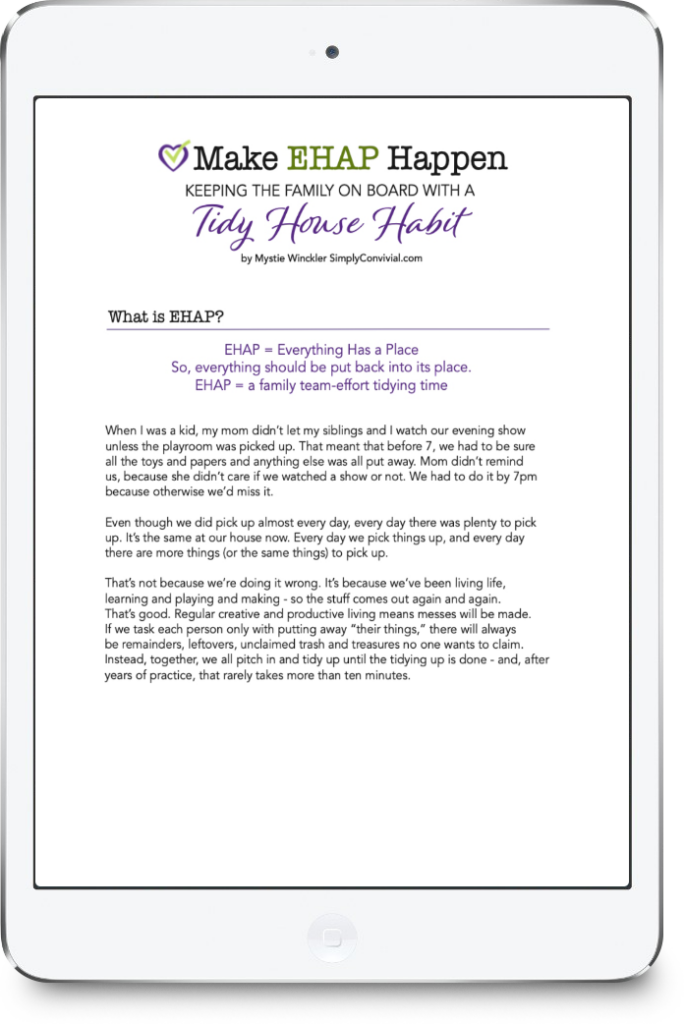
Want a Tidier House?
- Get clear where and when your family needs to tidy up.
- Bring the kids on board to take responsibility for tidying more than their own stuff.
- Learn the three steps to make the habit stick for the long haul.

Here are three steps to work through as you give things a home.
1. Create a plot and systematically work through it.
Start with the most-used areas of your home and systematically go through the storage and holding places, one by one.
It might take a year or even two to make it through the entire house, but you will be steadily seeing progress and building the habit of “homing” things as you go.
It’s worth the effort and time!
2. Empty the storage places, shelf by shelf.
When you start organizing an area, empty the space, one shelf or one section at a time. Then only put back on the shelf what will belong there. Label the shelf if you want, but more importantly, do not put anything back in the space “temporarily” until you figure out where it should go.
As you are moving through your house giving things homes, declutter by getting rid of the things you don’t need or don’t use. When you must make a “home” decision for each item, handling it and being deliberate, you will make better decisions about what to keep and where to keep it.
3. Designate a temporary catch-all place as you work through the house.
Of course, you do need a temporary home for random bits as you work through. Choose a bin and add the random things you need to postpone decisions about into it. As you work through your home systematically, what room is last on the list? Store your random bit bins there.
Yes, it will be a doozy of a room to work through when you get to it, but by that time you will have experienced the calm that comes from having a home for everything and your motivation will increase. You will also have a better idea for what spaces you have left, whether or not you actually need or want the thing, and how storage best works for you and your house.
A little time and space allows us to make better decisions about those peripheral items.
It’s worth the time to make homes for all the things.
18. Be impervious.
Our attitude is the most important factor in how we handle life, and it is a multi-faceted component.
One of the components of an organized attitude – and one we don’t consider often – is imperviousness.
The dictionary defines the adjective impervious as
- not allowing liquid to flow through
- unable to be affected by
This is not being unemotional, although at times it may appear so. It is, however, not letting circumstances or irritants dictate your emotions.
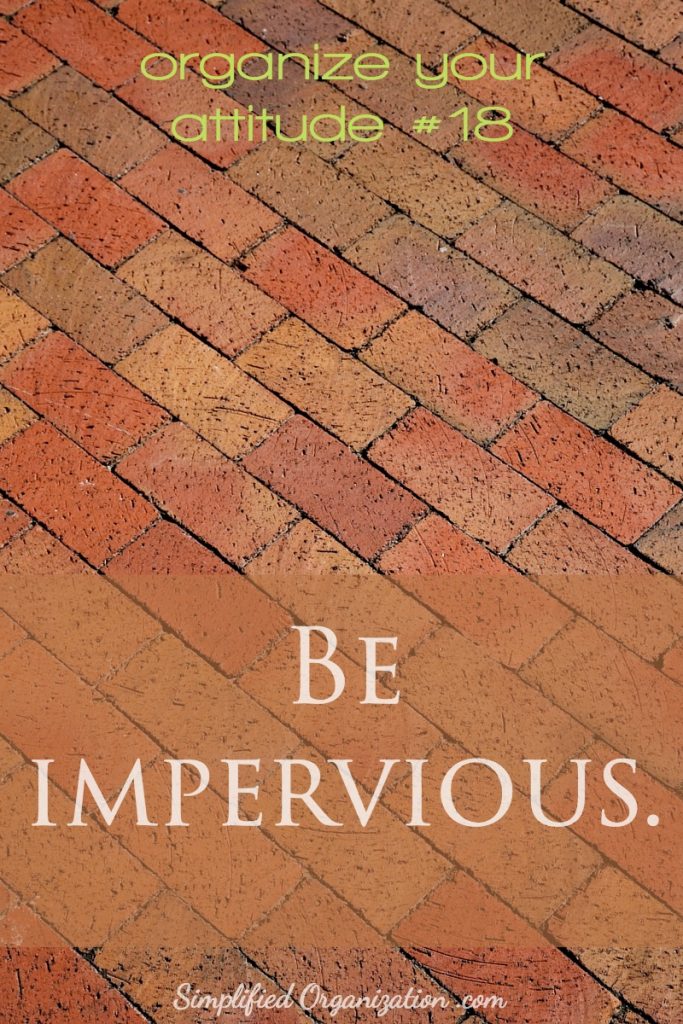
It is only if you are impervious – if those liquids of outer happenings and other’s behaviors don’t flow through to your nerves – that you can control and manage your own emotions and responses.
So how do we build our own imperviousness?
Here are some strategies I have used:
- Chant it as a mantra-motto when you find your irritation rising: Be impervious, be impervious.
- Fake it until you make it. Pretend you’re impervious. Respond as if you are. Slowly, you’ll have trained your habitual reactions and you’ll find you are actually impervious.
- Start and end the day with alone time – even just 5-10 minutes – and fit in a couple minutes here and there throughout your day. Don’t squander down time with aimless meandering around the house or online – close your eyes and breath, read a good book, walk outside and clear your head. Remove yourself from the madhouse regularly so you don’t become one of the madmen.
- Pray continually. Instead of a single morning prayer to get you through the day, build the habit of praying for grace to honor God in how you respond – a quick, desperate, “forgive me, Lord; help me, Lord” prayer – when you feel your irritation rising.
- Remember there’s always a way of escape. Others do not control your responses. We are commanded to love and irritation and resentment are not love. They are sinful responses. God forgives and He gives us the grace to choose to obey, but we need to turn to Him for that grace and forgiveness, as soon as we can, as often as we can.
To be impervious is not to be stoic. Rather, it is how we become the thermostat rather than the thermometer, how we set the tone for ourselves and for our interactions.
19. Kiss your husband.
It’s so easy in the hubbub of daily home life to lose sight of the fact that your family began with a marriage, not with children.
Our marital relationship is our primary relationship in the home. The children will grow up and move on to families and households of their own. You and your husband will remain.
So let’s keep in touch – literally – with our husbands to keep our homes and our own selves in harmony. We are wives before we are mothers and we will remain wives after our children move on.
Let’s act like wives in our homes rather than like nannies or maids.
This does not mean we need to have a date night out every week in order to have a thriving and healthy marriage. History testifies that such things are not a necessity, but rather a nicety. Do it if you can and if you like it.
Working side by side on a project or goal, cleaning up after dinner together while talking about the news, reading a book together, cuddling on the couch while watching a movie or reading, texting throughout the day – there are a myriad of ways to remain in contact with one another.
What we want to avoid is being mere housemates and co-parents. We want a relationship apart from the children. We need a connection – which does not need to mean heart-to-heart conversations every day, but rather a genuine interest in one another’s thoughts and projects.
And, through it all, we must remember that our marriage is a romantic relationship, whether or not we happen to feel it at the moment.
The fastest and simplest and easiest way to maintain the relational, personal connection we ought as spouses is to kiss – give your husband at least one, if not several, kisses a day that wipe away the thoughts of grocery lists and dirty floors. Even if just for a few seconds, such pauses and connection are beneficial not just to our husbands, but to us as well.
We need that disconnect moment. Don’t get it from zoning out in front of a screen. Get it from kissing your husband.
20. Blaze the trail.
This week during the Planning That Matters chat I hosted with several of my members, Libby made an excellent point near the end:
The more you do stuff the easier it gets. You know, it’s having those rails to run on. Setting something up is hard and getting [the kids] used to something is hard, especially if it’s something that isn’t appealing to them. … Blazing the trail is hard, but just walking on the path to the place you need to go isn’t so hard at all. The more consistently we do it the easier it becomes.
To blaze a trail or to lay down the rails is to intentionally decide and built the habits that we know will make our lives more effective. It will not make life easier – building the habits is hard work and paying attention and doing what’s called for in the moment requires attention and effort – but once intentional logistics become habit, then it takes less energy to maintain your equilibrium and consistency.

It is worth the effort and time to think through the logistics of your day, communicate your intentions to the children, and make the right thing to do easier to do – remove the barriers, even if they seem silly. Practice, practice, practice, knowing that the first week or two or maybe even three will be hard and there will be push back both from the children and from your own mind and gut. But if you can push past that, you will have a path instead of a jungle, and getting your day rolling will take less energy.
Acknowledging that it is hard work to set up a deliberate routine helps us make it through and stick with it long enough to see results. Even though we’re doing it so that life will flow more smoothly, we won’t expect it to be rainbows and butterflies from the beginning. The fact that there is extra resistance and difficulty upfront does not mean there’s anything wrong with our plan or that we’ve failed before we’ve begun. It means you are blazing the trail, cutting back the weeds, doing the hard initial work of cultivating.
When we look for what is easy, we will fall back into old habits and patterns. When we look for setting ourselves up for future success, our outlook shifts off of our current emotional state and onto anticipation of future growth and ability.
Be willing to blaze the trail and do not grow discouraged or weary when it is hard work. Persevere, and it will pay off. Do the good work set before you so you can move on to better and more good work later. You are doing this not for ease and comfort, but for effectiveness and competency. Once these habits are mastered, you will be able to go forward and build more into your life. But be willing to scale back for a time to lay the groundwork, to clear the path, so you can move forward with less friction and distraction in the future.
21. Make your bed.
It seems like such a little thing.
But sometimes it is the little things that make a world of difference, especially when it comes to our attitudes.

Yes, making your bed can change your attitude. I’m living proof of it.
Sometimes, when we’re feeling like our whole life is a mess and our home is worse and we aren’t even sure where our recovery plan should begin, our temptation is to simply give up. Starting is overwhelming and there’s no clear path forward – only a lot to do that will need to be continually done again and again.
Even if you get caught up on the dishes, there will be dishes to do tomorrow. Even if you get caught up on the laundry, there will be more laundry to do tomorrow.
Even if you make your bed today, you will have to make it again tomorrow.
For most of my life, this thought is what prevented me from making my bed. Or, it was at least my excuse for not doing it.
Know what happened? I became a wife, a mother, a homemaker and I started using that same excuse for dishes and laundry. It wasn’t pretty.
I tried so many overhauls of my routines and systems and none of them seemed to stick. Turns out, I was missing the key ingredient: an acceptance of entropy and my relationship with it – that is, my attitude about my life and the way God made the world.
Put your stake in the sand: Make your bed.
If overhauls have never worked for you in the past or if you just can’t seem to get traction, I dare you to start with making your bed. It is inconsequential in the scheme of things, but it is a statement to yourself about yourself.
When you make your bed every day, you are becoming the sort of person who brings order out of chaos. You are practicing doing the right next thing, no matter who does or does not see it. Making your bed is saying, “I choose to care” with your actions.
On top of that, when you walk into your room throughout the day, it is a visual reminder of your new leaf, your new attitude, your chosen approach to life.
The dailiness of it adds up. It’s practice. It works.
More on the habit of making your bed:
22. Write a daily note.
How do we keep track of all that needs to be done?
How, if we do track all that needs to be done, do we keep the most important tasks top of mind rather than lost in the sea of details?

We need to write a daily note.
The power of a little index card or post it note is in the brevity. It allows us to keep our expectations realistic and focused.
Selecting 3 priority tasks for the day and writing them down forces us to focus on gaining traction where it matters rather than get lost in the swarm of details.
But often when I’m choosing those three priority tasks, I have a tendency to actually choose extras. I tend to discount what I already need to do in the day and write down the top three things I want to do on top of what I already have going on.
This leaves me either frustrated or frazzled.
Our daily note needs perspective.
You might not feel that the normal things that we have to do in a day “count” much, and so put things on your daily list that will “count” in your own mind.
But what has God called us to in this day? Probably normal, average, typical jobs – done with joy. Certainly He has called us to have the law of kindness on our tongues.
Perhaps that is the sort of thing that we need to add to our daily list. I know it helps me when, instead of listing out project tasks I want to get to, I list not simply “finish homeschool day” but “finish homeschool day with a smile.” Or, instead of “write next blog post” choose to prioritize “look children in the eye when they talk.”
Writing down three priorities for the day is an excellent habit, one that does increase our likelihood of making progress, but as we do so we must actually choose our priorities and not our wishful thinking.
Here’s to realistic, short daily to do lists!
23. Get steps.
My Fitbit taught me this lesson.
I should have learned it earlier. When my son would start getting angsty over long division or reducing fractions, I’d send him out to run a lap around the yard. He didn’t think it helped, but it did. Using his body helped relax his mind. His breathing pattern changed. He got some fresh air and some space from the situation. When he came back, he had a fresh start and could tackle the problem with renewed attention.
Turns out, I needed the same thing.
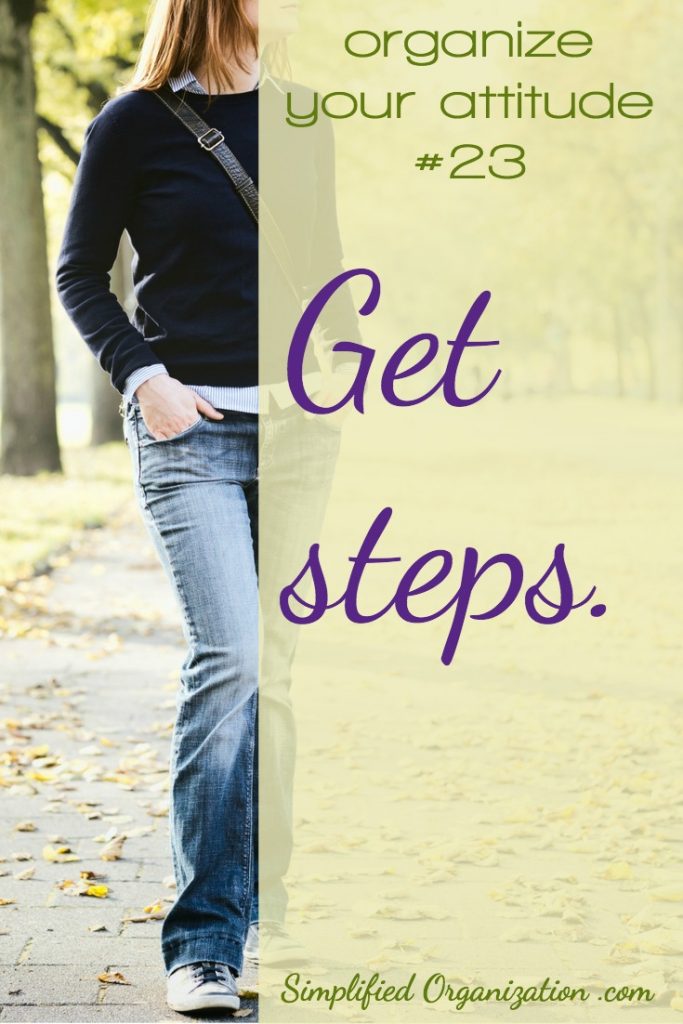
If it all suddenly feels like too much, rather than try to pick up speed and then lose it altogether, I now hop outside myself “to get steps.” Because of my Fitbit and the compulsion to rack up the step count it brings, I do this even when I’m not about to lose it inside, but as a coping strategy, it works wonders.
Fresh air, physical activity, a little space to take deep breaths, a way to capture some quiet moments to pray and repent and get ready to reengage – getting out for a few steps helps me organize my attitude as much as it helps my son tackle his math.
Of course, it could also make things worse. If I go out not to repent and regain calm but to mull over my problems and stew in my bad attitude, it would make things worse.
It’s not the steps themselves that help. It is how I use the time. Taking the steps is the structure I’ve set around taking a “time out” to put myself back to rights. The fresh air and the physical activity support the prime goal: organizing my attitude.
Plus, I get more steps added to my day.
Bonus!
24. Sing a song.
It’s impossible to be grumpy and sing at the same time.
Singing does something to us. It lifts us up out of our internal moping mode and puts us in tune. Through the movement of our voices, we move from discord to harmony.
When we know this strategy, our true hearts are exposed. Often, when I realize that I could sing and pull myself up out of the funk I’m in, I realize that I don’t actually want to come up out of the funk. I want to wallow, to fester, to mull. I would rather be cranky than sing.

It is good to see our hearts with that kind of clarity. It is good to be forced to admit the truth and not mask our sin, because then we can truly repent. We can acknowledge our bad attitude as our own heart problem. It isn’t anyone else’s fault but our own. It is our personal sin to own, so that we can cast it aside in repentance.
And the beauty of true repentance is shown in song. So once you’ve asked for and received forgiveness, the bad attitude melts away and is replaced not with a vacuum, but with rejoicing – which will readily be expressed through singing.
Certainly, it is possible to sing with an unrepentant heart. It isn’t a magic cure all by itself. But if you are fighting a bad attitude and walking with God, then singing is both a helpful tool and a reliable indicator. Can you belt out a hymn? Can you sing along to your favorite worship song? The world contains Anger songs and Bitterness songs and Sentimental Mush songs and Sadness songs – those do not require a singing heart to sing along with.
But if you choose a Joy song, a worship song, a True song, then you will either have to let go of your bad attitude to engage with the song and bring it forth or admit that you are unwilling to do so.
Let the word of Christ dwell in you richly, teaching and admonishing one another in all wisdom, singing psalms and hymns and spiritual songs, with thankfulness in your hearts to God. – Colossians 3:15
There is good reason to take this verse as a practical attitude-changing tactic – thankfulness, particularly when put to a melody, banishes our bad attitudes and guards are hearts from its attacks.
25. Get sleep.
Grumpy babies go to bed.
I learned that little catch phrase from a friend of mine and have used it so much that I’m sure my own children think that I invented it.
One thing motherhood teaches us is that we are not so different from our children. We have the same inclinations and the same attitudes; we’ve just learned to mask them better and in more socially appropriate ways.
Sometimes we just need to go to bed, too.

I’ll be honest. The other day I had a terrible, horrible, no good, very bad day. My attitude was crummy and all I could see anywhere I looked was messes and messing up. I tried getting steps. I tried taking a little break and “napping.” I tried ice water. I tried coffee. My husband prayed for me. I’d feel better for a moment and then the very next thing would trip me up again.
I wanted to be up after the kids were all in bed and the house was quiet. I had things I wanted to get done. But clearly, what I actually needed was simply sleep.
I went to bed at 7:30pm and I was asleep around 8. I woke up with my alarm at 5am and actually felt like getting out of bed! It had been the right choice.
Sleeping is letting go. Going to bed is admitting this day is over and there’s no getting it back or making it better. Sleeping is restorative and often what our minds and bodies are craving when they start shutting down.
I didn’t need a good book. I didn’t need a mindless movie. I didn’t need a glass of wine or chocolate or potato chips – even though those are all the things I thought might make the perfect end of the day. Simple, honest-to-goodness sleep was the solution, after asking each person’s forgiveness for being a bear that day.
It is a punishment to be sent to your room to stew on your grievances – a punishment that makes things worse instead of better. Bitterness grows in mulling over things with a bad attitude. But going to bed is one way to send that bad attitude packing and shut it off, letting your body and mind recover and renew.
Maybe it takes a Tylenol PM or a low-dose melatonin, maybe you’re really so tired you don’t need a thing – but when you just can’t find any capacity for handling life, go to bed, get some sleep, and pray about it in the morning. Joy comes in the morning. Sleep helps.
26. Drink water.
Some mornings it’s difficult to shake the sleep-fog off.
Some afternoons it’s hard to beat the afternoon slump brain fog.
Some days we just can’t seem to get all systems clear and running.
Try a tall glass of cold water.
Even mild dehydration can cause brain fog, fatigue, and headaches. Slugging back a glass full of cold water rehydrates your body, helps flush out toxins, and wakes you up as your body rushes blood around to warm your system after the cold shock.
There’s no harm in it, and it might be just the ticket.
Water is a cheap, easy, no-risk strategy. Just drink water.
So, besides chugging a large dose when we need a boost, we should also be drinking more water throughout the day.

Build the habit: drink water.
Drinking water is really just a habit.
Make it easy.
Keep a glass by the sink or fridge. Take a water bottle with you in the car. Do what you can to reduce the barriers of getting a drink.
Give yourself cues.
Decide to always drink a glass with each meal. Pick a time you sit down to do something most days and add in sitting down with a glass of water. Always get a drink before and after exercising – find those pegs in your day where you can tie in the habit of drinking some water and watch the ounces add up. Just drink water.
Set a measurable goal.
Water can be measured. So try filling a pitcher, putting it in the fridge, and setting a goal to drink the whole thing before the day is over. Just drink water.
Make it fun.
Add lemon slices to your water cup. Add cucumber and lime slices to a pitcher in the fridge. Fresh ginger slices or cinnamon sticks in water are both good and different ways to make water seem less boring and more like a treat. Just drink the water.
The two most important glasses.
The first two most significant water habits you can build are to start and end your day with water. Always drink a glass of water before coffee – you need to rehydrate after sleep and your body will be able to handle the coffee better if it’s had that refreshing morning glass first.
Then, end your day with a cup of water, too. Your body needs water to repair itself, so give it what it needs for a good night’s sleep.
If you find yourself suffering from morning fog or an afternoon headache, reach for the water and see if your body is simply trying to tell you its dehydrated. It’s a simple fix, and a good first line of defense.
27. Find accountability.
There is so much to do. Always.
And there are always distractions, other possibilities, and any number of potential and real problems to derail our plans.
Sometimes our plans do need to take back seat to real life. Sometimes we have to adjust on the fly and simply take care of the emergent realities as they unfold.

But sometimes the reason we don’t follow through with our plans is not because something more important came up, but because we simply forgot. Maybe it’s not even that we forgot, but that we purposefully turned our eyes off our plan and toward distraction and anything except what we should be doing.
What can help us stay the course? What can help us keep our eyes on our priorities when we are having a hard time bringing our energy and attention to where it needs to be?
Friends.
We need community. We need to know we aren’t in this alone. We need accountability.
Not only does it help knowing that others are doing life with us, bearing the same temptations and responsibilities, understanding exactly where we’re coming from, but it also helps to say out loud and to another person what it is that needs our attention each day.
If we say it out loud, we’ve identified it. We’re clearer in our own head and we’re committed. It helps to have a friend with whom we can swap goals and commiseration. We can cheer each other on and ask how that specified task is going.
This kind of accountability can happen daily or weekly. It can be in person, by text, by email, or by voxer. It can be informal and friend-to-friend or committed and purposeful and consistent. You can choose to identify a daily goal in the morning and check in every day. You can choose to identify a weekly goal or weekly zone or theme and check in on Mondays. You can do it with one friend or with a small group of like-minded women.
With technology woven into our lives, we might as well leverage it to help us build our friendships, our communities, our accountability to one another.
As part of Simply Convivial Continuing Education, we’ve begun a Monday email that goes out that is both a reminder to set a weekly focus and a motivational jolt to make that leap and commitment. You could even do the same for yourself by setting a recurring alarm on your phone as a reminder or use a service like x to send yourself a text reminder automatically.
These are useful, but not as compelling as having a real person who knows you and who responds walk the journey alongside.
Grab a friend, tell her what your priority is today, ask her about hers, pray for each other, and keep up with life – together, side by side. It will help.
28. Say thank you.
We all know gratitude is important. But sometimes it can be a bit vague. So say thank you.
Is gratitude a feeling we’re supposed to float around in all day? A sentiment just bubbling up from our heart to our head and staying there, providing serene thoughts and a calm demeanor?
Do we just list out what we’re grateful for in a journal, directing our thanksgiving to ourselves? Is that really thanksgiving or just a warm and fuzzy feeling?
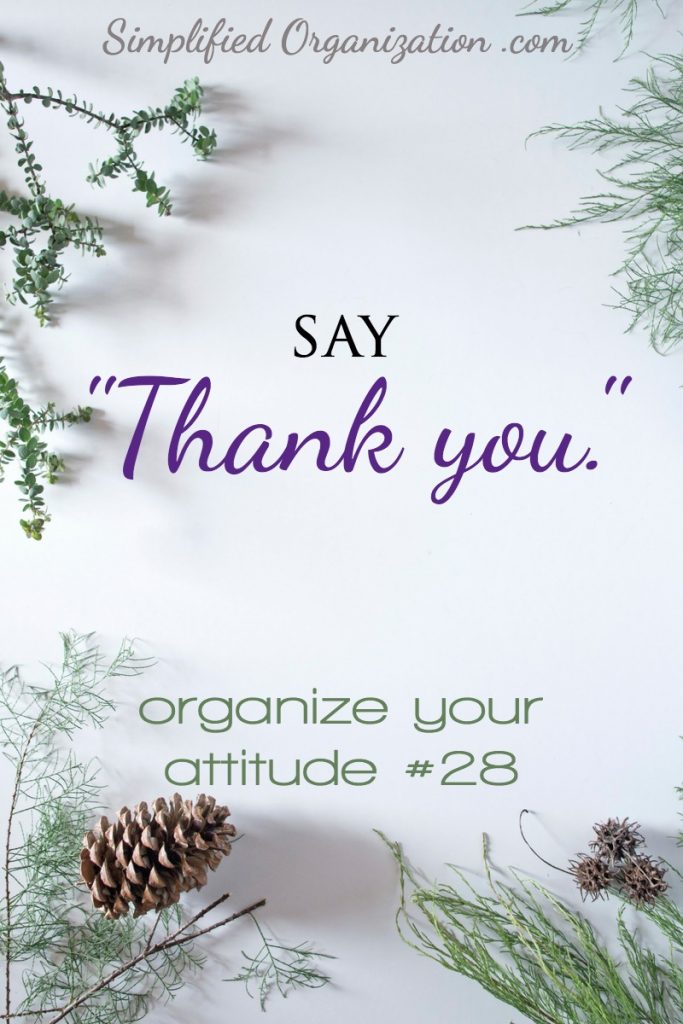
No. Gratitude isn’t gratitude unless it is directed at a person. You can’t be grateful to the world in general, to the universe or fate. The universe doesn’t care. It is not a receiver of thanks.
The Creator of the universe is a Person. He can be thanked, and should be. Gratitude overflowing in our hearts needs direction and expression, and He is the proper recipient.
But also on a lower level, in the midst of the day-to-day, we should be expressing gratitude if it is to characterize us.
Do you say thank you? Is it a reflexive habit?
When your husband hands you a cup of coffee, do you say thank you?
When your child runs to grab a towel or diaper for you, do you say thank you?
When your waitress refills your water, do you pause and say thank you?
We want our children to build habits of politeness, but do we have them ourselves? Are we modeling it? Does gratitude spill out of us such that we notice and say thank you whenever someone does us a little favor?
It is the noticing that needs cultivating. Of course we say thank you when we notice, but the capacity for noticing when others serve us must be cultivated and practiced. If we want to grow in gratitude, we must grow in noticing. And that can begin with as simple a practice as saying thank you as often as we can manage each day.
Once we’re on the lookout for opportunities to say thank you, we notice more and more.
Growing in gratitude is not simply about feeling good feelings, but about paying attention and acting in kindness. It’s a concrete thing we can do, and the more we express gratitude to the people around us, the more it becomes contagious – a way of being, a way of interacting with one another.
But it starts with us.
Let’s practice saying thank you.
29. Get dressed.
How you dress affects your attitude.
You know it’s true. Don’t fight it.

If your shoes pinch your toes or your jeans cut into your tummy, it makes you cranky and irritable.
If you stay in your pajamas, you miss out on the energy flow that comes from knowing you’re ready to take on the day, come what may. Your pajamas signal to you that you’d rather be sleeping, rather be lounging, rather be anything but alert and moving.
Whether we like it or not, what we wear communicates something about it. What we wear also communicates to us.
The fancy dress, curled hair, and lipstick is not only for others or to honor the event, but because we feel and behave differently when we are dressed up.
Schools institute uniforms because kids act differently and treat each other differently when they are dressed a certain way.
What if we had a mom uniform? What if we chose an outfit that would help us get in the mood, that would communicate to ourselves and to our children that we are in the game and ready for action?
When we are dressed and our children are dressed, our homes have a different kind of atmosphere. When we have our outfits that tell us, “Ok, time to start the day! I’m ready!” then it’s easier to actually start the day feeling ready.
It doesn’t have to be fancy or special. It can be machine washable and stretchy. Maybe it only means a cute shirt and earrings with your yoga pants. But it should be “getting dressed.” It should be something that you wouldn’t be embarrassed if someone knocked on the door or if you end up having to run out the door to take a child to the doctor.
Being dressed means you’re ready to tackle whatever the day throws your way, and that helps your attitude and your mindset going in.
Give it a shot for a week and see if it doesn’t help you feel better!
30. Have a menu plan.
Do you know one real downer that happens all too often? Not knowing what’s for dinner when 5pm rolls around.
You know what I’m talking about. And, yes, it happens to me, too.
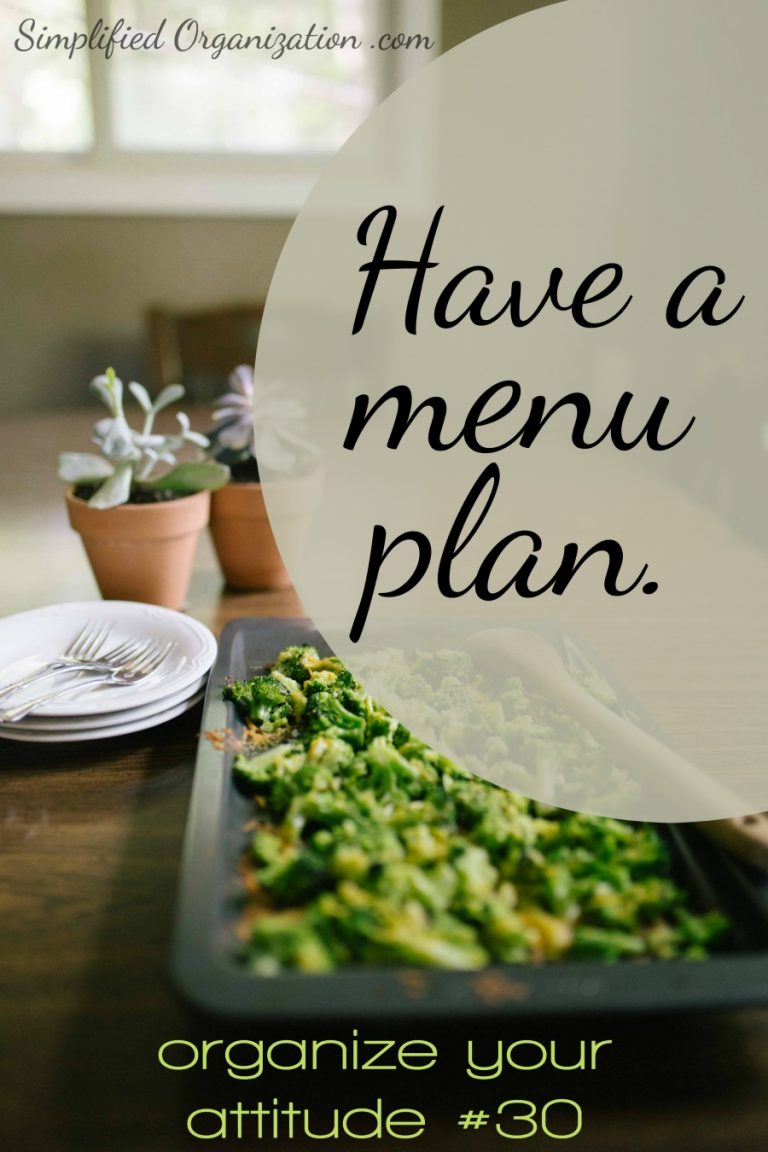
Do you know one real awesome feeling? Knowing at breakfast time what’s for dinner, pulling the meat out of the freezer the night before, and maybe even doing a little head-start prep while the kids eat breakfast.
A menu plan makes those mornings possible. A menu plan helps prevent the first scenario, even when you don’t follow it exactly. Because you’ve thought through options and have food on-hand, you can still pull something together if you have a few menu planning strategies.
We don’t often think about menu plans in terms of our attitude, but so often our ups and downs are based on whether or not we feel “on our game,” and the beginning of being “on game” is knowing what’s for dinner.
There are several different strategies you can try:
- plan meals 6 weeks at a time
- menu plan by thinking in 3s
- meal plan on Google calendar
- plan all the meals
If nothing else, a quick menu planning session during your weekly review – one that doesn’t involve internet searches or specialty ingredients, but one based on a basic pantry – will make a huge difference.
When even that is too much, a morning menu choice will still accomplish the goal: knowing what’s for dinner that day before the day gets rolling so you’re not caught unawares by the afternoon, so you can pull the pieces out of the freezer, so you can make sure you have what you need.
Want to start the day feeling on top of your game?
It begins with knowing what’s for dinner.
31. Eat breakfast.
Do you stop to eat breakfast every morning?
A cheerful disposition is not only mental. It is also physical. Our stomachs have a say in our attitude, and we would do well to not overlook that reality. We’re not above our bodies. When we are hungry, when our blood sugar drops or spikes, when we don’t drink enough water, we will have a harder time maintaining our mental equilibrium. We need to eat breakfast.
Breakfast is one of those essentials to setting ourselves up physically for handling life as it comes.
Don’t skip breakfast.
When the mornings get crazy, it’s easy to save time by not stopping to eat. However, this sacrifice is not worth the cost. You might be saving time, but you’re not saving your attitude!
Too often, it’s not until we’re crabby and snapping at the children that we realize we missed breakfast. And then we have a mess to fix, a day to put on pause, and a breakfast to grab.
We might not even intend to skip breakfast, but rather let it happen on accident by not making it a dedicated part of the routine. Solve this attitude-wrecker by slotting breakfast into your routine before the day gets going.
Do eat a satisfying breakfast.
Grabbing a too-quick breakfast, especially as an emergency measure, is not the best way to ensure stable blood sugar.
It does matter what we eat for breakfast – coffee alone, or even with cream, does not an adequate breakfast make.
A breakfast with protein sticks with us, evens our moods as well as our blood sugar, and can be quick and easy. My own breakfast of choice is eggs topped with a bit of cheese. Changing up the type of cheese – cheddar, Parmesan, Jarlesburg, Havarti – is a simple way to vary the taste without rethinking the menu.
Having a satisfying go-to, everyday breakfast is a strategy that makes it possible to fit breakfast in and set yourself up for morning stability rather than morning grumping.
Remember to eat breakfast!
32. Make something.
At the end of the day, do you check out, flat and dull? After a full day of managing life and other people, do you have no oomph left?
After a long enough stretch of doing-doing-doing, we need to recharge, refill our minds and souls, and connect with others and with our creative side.
As humans, we are made in God’s image. God is a Creator, The Creator, who created the entire world out of nothing, ex nihilo. We are little creators, mirroring His creativity and finding satisfaction in doing so.
Whether it is a meal, a special dessert, a quilted or knitted garment, a set of socks or mittens, Christmas ornaments, cookies, a painting or a sketch, turning raw materials into a beautiful whole is deeply satisfying, even when we novices, doing it for the pure joy.
Creating something is a way to experience joy. Plus, unlike housework, it stays done.
So if you’re feeling the blahs, feeling worn out by a task-oriented mindset, turn to creativity for an attitude boost.
Choose a creative hobby.
Having a hobby gives you a skill you’re learning and improving in, a practice you can turn to regularly to express creativity and originality.
It takes time and practice to learn an art, so choosing one or two arts as your own narrows your focus and also stops decision fatigue – you know what to turn to and you have supplies on hand.
When you claim something as a hobby, it makes it seem more natural and acceptable to turn to it during an afternoon break or in the evening, also. It becomes your go-to activity and can also be a point of connection with other people who practice that art.
Find creative outlets in your regular routine.
Expressing creativity doesn’t have to be limited to hobbies and extracurriculars. We can also weave it in to our everyday lives to fill them with beauty and a personal touch.
You might add your own flair to the dinner recipe or add a garnish, even though it’s a Tuesday. You might light candles at the dinner table or change out the table cloth. You might fold your clothes just so because you find joy in the way they look in the drawer. You might iron not because you have to, but because you love watching the transformation of wrinkly to crisp and neat.
Edith Schaeffer’s lovely book, The Hidden Art of Homemaking is all about finding ways to express our God-given creativity in the day-to-day of home life.
Making something beautiful puts us in touch with our humanity, our Imago Dei.
So when you start to feel like you’re just a pinball in a mechanical hamster wheel, step off and do something creative.
33. Ignore the mess.
Christmas is almost here. Kids are off school, excited, and doing what kids do best: creating messes.
Add to that typical chaos all the extra stuff of Christmas – more sweets, new toys, wrapping paper, packaging – plus extra exuberance – and you have the makings of a real disaster.
But it’s only a disaster if you look at it with the attitude that your home should always be neat and tidy and life is all messed up if it isn’t. That attitude is a mental disaster in the making. Before you grab the mop, look to your mindset.
If, instead, you look at the Christmas chaos as a glorious real-life upset (like the incarnation was) then you can mentally deal with the overflow of stuff, the overflow of energy, the overflow of lifewith a more cheerful demeanor.
The children, the family, the guests – they are not obstacles to your peace and calm which should be yours this Christmas. They are your avenue of service, your people whom you can give Christmas to. They receive and give back in overflow – it’s messy, there’s extra friction, but it’s good work.
The extra food, the extra decorations, the extra stuff – these are not obstacles to your home’s perfection. These are the ways we love our people. We express care and love to them in tangible, visible, even delicious ways through the stuff.
Yes, there’s more work. It’s good work.
Yes, there’s more mess. There will be a time to tidy it up, but let yourself enjoy the hubbub and the chaos, ease up your expectations and let joy overflow.
The peace of the season comes from a heart focused on Christ. Christ came to save us, sacrificing Himself. He joined the hubbub and chaos of the real world and took part in parties, in meals, in crowds, in churches. Yes, He sometimes withdrew, but when He was teaching and serving others, he joined them where they were.
Instead of trying to grab the Christmas peace we want by shutting down the exuberance of our children, let’s join in it, meeting them where they are and letting the mess be part of the joyous experience.
Make food, wash dishes, wrap presents, see the paper and packaging fly and the pieces of new toys explode and marvel that God gives so generously and loves so freely. He loves us when we are messy, when we are silly, when we are petty. He cleans up after us, washes us, shows us a better way – in love and with care and joy.
We can partake of that joy this Christmas season by being generous, joyful makers of the Christmas spirit this week.
Keep a smile on your face. Ignore the mess. See the children. Enjoy the expressive, over-the-top, incarnational Christmas experience.
We’ll clear the decks again in January. For now, share the Christmas abundance and joy.
34. Hug your children.
Once upon a time, I had a somewhat embarrassing item on my daily checklist: Smile at each child.
Eventually, I graduated to “Hug each child.”
Yes, it was on my list that I had to actually check off, because I knew it was a good and necessary habit for a mom to have, and yet I did not have it.
Slowly, checkmark-by-checkmark, I built the habit until I didn’t need it on my checklist anymore.
It’s too easy to lose track of the small things that really matter. We get grand plans and big ideas and forget that it’s the little touches that make a big difference in the end.
Relationships are built with each word, with each touch, and sometimes what we really need to pay attention to is the foundation: the tone of each interaction. Moment by moment, our connection with each individual child is being strengthened or weakened.
All it takes is a hug to add a touch of strength.
All it takes is a harsh word to weaken it.
So let’s make sure those touches of strength happen at regular, intentional intervals – it matters. They add up.
Even if it seems silly to put something you know you should do naturally onto your daily checklist, it’s better that it be on a checklist and done than only done sporadically. It’s not less heartfelt because it’s on a to do list.
That to do list is only doing its job if it points us to our priorities and our responsibilities.
Hugging our kids is not only for our kids’ benefit, either. It’s for ours.
When we feel out of sorts, reaching out to hug our children is a physical, tangible reminder to ourselves of what matters. It is a response we can choose instead when we feel like yelling.
Don’t just stuff the wrong reaction, move forward by choosing the right one: love in the little, daily things.
We can actively change our own demeanor and the tone of our house by hugging our children, by smiling into their eyes, by listening without a frown.
Even if you have to put it on your morning checklist, do it.
35. Go to church.
I was glad when they said to me, “Let us go to the house of the LORD!” –Psalm 122:1
We’re not meant to do life alone.
We’re not even meant to do life as a single family unit.
We’re meant to live in community and fellowship with a body of believers, regularly, intentionally, and humbly.
Attending church is a way to organize our attitude because at church we confess our sins, worship God, and fellowship with believers.
Go to church to confess sin.
Of course we should confess our sin daily – privately as well as in seeking forgiveness from those we’ve wronged. But a weekly corporate reminder of our need for grace, mercy, and forgiveness on that first day of the week sets the tone for the rest of our week.
Not only do we confess our sins, but we hear the promise of forgiveness and receive the preaching of the gospel.
How then will they call on him in whom they have not believed? And how are they to believe in him of whom they have never heard? And how are they to hear without someone preaching? –Romans 10:14
We confess our sins not to remember guilt, but to shed guilt because of Jesus’ righteousness.
There’s no better attitude adjustment to be had than that one.
Go to church to worship God.
Our own daily bad attitudes are so petty. We think too highly of ourselves and our plans.
Sunday reminds us to set those plans and agendas aside and simply stand in awe of Christ and His work for us. It’s a day of rest – rest from our labor, rest from our striving, rest from our sinful ways, rest in Jesus.
It’s a taste of the heavenly rest we will receive in Christ eternally – there we will worship, and here we can worship. Just like offering our money to the church and missions reminds us that all our money is God’s, setting aside one day out of seven to worship reminds us that all our time is God’s as well.
The attitude adjustment of worship is not in emotional music or inspiring sermons, but in obedience to worship as prescribed, conforming our thoughts and actions and even schedules to God’s plan instead of our own.
Go to church to fellowship with believers.
The church is called Christ’s bodies – each individually is only one small part, one small part that needs the other parts to function properly. We’re not made to do life alone. We need more than our own family unit, we need the body of Christ.
We need others’ perspectives. We need others’ prayers. We need to be sharpened with the friction of iron on iron. We need to learn what it means to bear with one another and pursue the bond of peace together.
You don’t have to – really, you can’t – change your attitude all on your own by yourself.
The Holy Spirit changes our hearts, and one means He uses to do just that is regular weekly worship as a body of Christ.
And let us consider how to stir up one another to love and good works, not neglecting to meet together, as is the habit of some, but encouraging one another, and all the more as you see the Day drawing near. – Hebrews 10:24-25
36. Go to the doctor.
When my youngest child turned 4, I realized something.
For the last 13 years, the primary medical attention I had received was from a midwife. Sure, there’s been an occasional urgent care visit, but besides a midwife, I had not seen a primary care physician.
As I was making routine well-child visits (all overdue) for my children, my husband encouraged me to make one for myself as well. I’m not unwell. I’m not even low-energy. But preventative care is a good idea, especially if it’s covered by insurance. We know women who did not know they had cancer until it was late in the game. A short exam is worth early detection.
After answering all the doctor’s health history and lifestyle questions, she ordered blood work. Everything came back clear, but that blood work would have shown immune issues, thyroid issues, pre-diabetes, vitamin deficiencies, iron deficiencies – a number of issues that I might not catch on my own but that might needlessly slow me down.
With all results in the clear, my doctor put me on the “three-year plan” – I’ll go in for another routine preventative physical in three years.
Of course there are considerations like cost and distance and finding a doctor you trust, but if you don’t have a family doctor, it’s worth the effort to find one – by friends’ recommendation if possible.
If you don’t have a doctor, don’t pick one at random from the phone book or choose based on who is closest to you. Ask your friends for recommendations. Look at reviews online.
If you don’t like being treated according to the lowest common denominator at the ER or urgent care, get thee a primary care physician and a physical – let their records show you’re responsible, reasonable, and healthy. If something does go wrong, you’ll be glad you have an established relationship with a doctor you trust.
Seeing a real eye doctor (after the optometrist in Costco’s optical department told me I had 20/20 vision) and getting glasses two years ago cured my afternoon headaches (a side effect of my eyes & brain overworking for that 20/20 vision). Likewise, you might find a simple fix for what you’ve come to accept as your normal.
It’s possible that what looks like an attitude problem is being caused (or amplified) by an underlying health issue that a physical or blood test can uncover.
It’s worth the time and effort to locate and establish care with a family doctor, even if your family is healthy.
37. Purge a closet.

What’s in your closet?
Do you know? Is it a black hole?
Sometimes, setting order to one small area helps us set order to our mindset and our attitudes.
Our closets might not be publicly visible spaces, but they are personal spaces. Our closet, whether we like it or not, says something about us. What does our closet say?
What message are we picking up from our own closets each morning?
Most likely, our children aren’t often in there, messing around. So whatever order – or disorder – is there, is there by our own doing and cannot be blamed on others. That might be a hard truth.
On the flip side, if we establish some order in this one small, personal space, it is a gift to ourselves. It reminds us that we do value order and are making it more and more a part of our identity. We’re people, now, with orderly closets.
No one else will mess it up. In this small area, we can learn the habits of personal orderliness.
Clear a closet; clear your head.
Remove from your closet anything that doesn’t fit.
Remove from your closet anything that you don’t feel pretty or lively wearing.
Do you have anything left?
A wardrobe revamp might be a project for another time, but we can’t put order in a closet with unused items. Move the clothes that don’t fit to another less-used space. Bring to the forefront the clothes that bring you joy and make you ready to start your day with your best self.
Toss the trash. Set the shoes in a line. Give each item a proper home and put it there.
Maybe you think it’s a waste of time to put your closet in order, but each and every morning when we get up and enter the closet to get ready for the day, it can be a visual cue setting the tone for the rest of the day.
It’s a small but significant step.
38. Laugh.
You know those days. Those terrible no good days where we just can’t seem to pull ourselves together, even after two (or three) cups of coffee.
Sometimes we have to choose the right attitude before we feel it. If we wait for our feelings to lead the way, we’ll be left nursing hurts and holding grudges. We’ll be left with our coffee dregs and headaches, feeling miserable.
It’s tough. Feelings are powerful and insensitive to reason. You can’t just shut them off.
You have to actually exchange them, not ignore them or stuff them. Changing our attitudes is a positive action we have to take, even in the midst of feeling crummy.
There is one tool that works faster than any other: Laughter.
Even if it’s watching a funny video or some other external prompt to elicit seeming-surface laughter, the act of laughing can diffuse anxiety and grumpiness faster than anything.
Proverbs 17:22 – A joyful heart is good medicine, but a crushed spirit dries up the bones.
Choose to laugh. Help others laugh. Put yourself in the way of humor – any kind of humor that will cause you to crack a smile and loosen up – and feel the tension dissipate. Then get going, sweeping the tension clear and choosing to do more of the right things and less wallowing.
Laugh at yourself.
A glad heart makes a cheerful face, but by sorrow of heart the spirit is crushed. Proverbs 15:13
Laughter comes from a humble heart, a heart not weighed down with burdens. It doesn’t come from a heart that is full of itself.
When we are face-to-face with our inadequacies or our failures, yes, we need to repent, and repentance often comes with tears, but we should also laugh.
God made us human. He did not make us machines.
He made us a little lower than the angels, and then we fell further – but He knows that, and He redeems us.
Humor comes from realizing discrepancies: It should be like that, but instead it’s like this.
Humor perceives ridiculous inadequacies and instead of bustling in to meddle and set things right, a humorous and humble mindset accepts them as a part of reality, something in God’s hands to work out.
Laugh with your children.
Laughter is a key to building strong relationships. It’s a concrete practice that builds camaraderie and communion.
The more we can laugh at ourselves and laugh with our children, the healthier and more resilient will be our minds and the better and stronger will be our relationships.
Laugh because of Christ.
Then our mouth was filled with laughter, and our tongue with shouts of joy; then they said among the nations, “The LORD has done great things for them.” – Psalm 126:2
The only reason we can laugh at the discrepancies in ourselves, in our families, and in the world is because Christ has come and will set things right. If we are in Him, we can rejoice and praise Him for all He has done and will do.
Read Psalm 2. God laughs at proud, evil men. So can we, because we hope in Him. So can we, even when that proud, evil heart is our own – because God changes our hearts and has made us right.
Joy – even laughter – is the response of a grateful, trusting heart. In laughter our stress and anxiety melts away. Laughter is an act of faith.
39. Build your house.
The wisest of women builds her house, but folly with her own hands tears it down. – Proverbs 14:1
Our words build or tear down – there is no neutral. And what do they build up or tear down? Our own homes, our own families.
Every word we say, every look we give, communicates to our children and gives them identity – whether good or bad. We are their mothers. Even while arguing and complaining, they are looking to us for meaning, reassurance, and love.
It is within our power to give or to take.
Let us make sure our words give.
Even if our own attitudes stink and we say something harsh or rude – when we have torn down – we can build up yet stronger or tear down yet further. Words spoken and hugs given to seek forgiveness build stronger houses than words ignored and swept under the carpet.
Even when tearing down does happen, God graciously allows us to rebuild again and more strongly if we choose His path rather than our own and seek forgiveness and reconciliation, forgetting our pride and choosing humble obedience ourselves before demanding it of our children.
So often, the words spoken to talk a child out of a bad attitude hit home as well. Our house is built by our own attitude and our own ability to take our own advice. We need not only to give advice, but to show them how to follow it. That is building our house.
Our attitude, even without words, builds or tears down those within our homes, makes them stronger or weaker. That is one reason why it is so important to deal with. We need to take the steps to correct our own grumpiness and laziness and despondency while it is small, because if left unaddressed, such will grow into wolves that will huff and puff and show our houses to be made of twigs.
Kill the wolf while its a pup. Ask God for the bricks of love and lay them as the foundation and the strong walls of your home with the mortar of kindness and affection. Wolves might come howling, maybe your pet wolf, maybe someone else’s, but in a house of brick – a house built on love and forgiveness and kindness – we can boil those wolves for supper if they try to get in. No biggie.
Lay those bricks. Build your house. Organize your attitude.
40. Have a good cry.
To organize our attitudes does not mean to “buck up,” “get over it,” or “plaster on a smile.” Organizing our attitudes is not positive-thinking changing reality.
Organizing our attitude is recognizing that our perception of reality is an interpretation, and double-checking that our interpretation is correct. If we’re getting cranky because of the way we see things, we’re not seeing things correctly.
No, there’s not always a way to spin our view so that things are going our way. The problem is that we get cranky when things don’t go our way. When that happens, we have an opportunity to humble ourselves and accept the reality that God has sent us – whether that’s another load of laundry, a muddy child, an argumentative teen, or another cloudy day.
Organizing our attitude and changing our perspective is about giving up what we were trying to get and doing what God would have us do – and that’s never going to be getting cranky, yelling, or holing up in our room with chocolate while our house falls apart.
Sometimes, this clash of perspectives and possible interpretations – ours, our children’s, God’s – is too much for us to handle. Sometimes, changing our minds to align with truth is painful. Realizing we were wrong and need to change hurts.
It might bring tears.
That’s ok.
Sometimes our bad attitudes escape us not with a big breath and grit, but with a torrent. Sometimes they need to be washed out.
Cry the bad attitude away. Cry not trying to hold on and grasp the pain or the false expectations, but cry them out so there’s space for prayerful renewal.
Repentant tears, rather than angry tears, will make way for the organized attitude.
So don’t hold them back or think you should be able to change without them. Let them wash away your angst and receive comfort and grace and a new attitude from the Lord in the midst of your wet pillow.
Those who sow in tears shall reap with shouts of joy! –Psalm 126:5
41. Read a novel.
Yes, read a novel. It doesn’t even have to be a Great Book. Just a story.
Get out of your own particulars, relate to someone else, and gain perspective.
When we read novels, we are able to see the world from another point of view, experience different settings and lifestyles and circumstances, and are better able to see how small circumstances build into a big picture – into a story.
Novels are not a waste of time.
I’ve shared before how it was a novel (or two) that brought me out of a housecleaning funk and showed me the importance of a neat and tidy home. Perhaps a novel contains the paradigm shift you need, also.
When our own little problems loom too large in our own eyes, when x, when x, then we need to hit the pause button.
A novel is a pause button.
Maybe a chapter at bedtime is just the mental break you need.
Maybe a “mental health day” is what you need – instead of binging on Netflix, pick up a novel and read the whole thing in one day.
When we start taking ourselves and our situation too seriously, start getting all uptight and overwrought, start losing it over the littlest provocations, we need to stop. Spending some mental and emotional time in someone else’s world and problems helps us see our own in a more healthy light, in perspective, and in the context of our own story.
Just as the story we read has struggles and stress, it moves to a conclusion where it all comes together. Life is like that, because it is God’s story.
One way to help yourself see your life as your story is to immerse yourself in someone else’s story.
So pick up a novel for your attitude’s sake.
Suggested novels for perspective
Sure, you could read Anna Karenina, Kristin Lavransdatter, or Mansfield Park, but you don’t have to commit to anything so grand to reap the benefits of getting out of your own head and your own particulars and learning from the experience of other women, even if they are fictional women.
- Little Women* by Louisa May Alcott
- Little House on the Prairie* by Laura Ingalls Wilder
- Hannah Coulter* by Wendell Berry
- The Scent of Water* by Elizabeth Gouge
- No. 1 Ladies Detective Agency* by Alexander McCall Smith





42. Have a grocery route.
I know there have been trips to the grocery store where I have felt like the little boy in Family Circus: If a line was trailing behind me it would be meandering, backtracking, and illogical.
A little upfront thinking and stratagems can drastically reduce your grocery-store footprints – saving you time and energy and effort.
Here’s how:
- Next time you’re at the store, pick up a store map. Most grocery stores have them near the entrance, but sometimes they are near customer service.
- Grab a highlighter and your master pantry list. Highlight the aisles that contain items you purchase. When I did this, I was pleasantly surprised to see that I only need to go down about 30% of my supermarket’s aisles.
- Sketch out a route from the entrance to the check-out that takes you by all the aisles you highlighted in the most efficient way.
- Now, this might feel silly, but study this personal traffic flow plan. Take it with you for the next couple times you go to make sure you follow it. Soon it will just be your habitual rut through the store, and when it is, you won’t even have to worry too much about forgetting your list, because you’ll be walking by your standard items and can be reminded in that way about what you need (or can grab an extra, just in case, knowing you’ll use it).
Once you have a habitual pattern through the store, the mental effort of decision making as you’re shopping will be surprisingly slashed. Try it!
43. Wear an apron.
Can an accessory change your attitude?
Sure!
For one, an apron can make it feasible to get dressed each day – which we’ve already established helps our attitudes – by protecting those clothes from messy work.
But also, an apron helps us set a tone and a mood. It can become a cue, telling us, “Now it’s time to get into dinner-prep mode” or “Now it’s time to go on a cleaning whirlwind.”
In a way, it harkens back to childhood dress-up days. An apron is an outfit that puts us in a certain mode. We’re putting on our homemaker costume and we’re ready to act like it.
As an additional bonus, an apron gives us pockets, which are handy for getting things done efficiently. Women’s clothes are often missing utilitarian pockets (who wants the added padding anyway?), but an apron gives us a place to stow our rag or scrubber or the random Lego bits we find everywhere.
But the true secret of the apron for our moods is the cue, the trigger. It’s an easy first step we can take. First, apron. Next, housework. First, apron. Next, dinner prep. Often the hardest part of getting to the housework or the cooking is getting up and getting started. Putting on an apron is a small, easy step that helps us shake off the computer-screen daze or the couch-potato inertia. An apron and relaxing don’t go together. So put on one and get your groove going.
Then, once your work is done, take off the apron, get a beverage, and take a moment to relax. Sit down to dinner without the apron. Change the mode you’re in with a change of costume. Signal to yourself and to others what time it is.
Make it a ritual. Rituals help our attitudes because they help us overcome inertia and apathy with physical habits rather than mental effort, which is often in too-short supply.
Better yet, get an apron for your children also. Don those aprons together and scrub together. Adding a costume makes it a game.
Right? Well, it helps, anyway.
Try it.
44. Take a photo.
In this series we’ve been looking at short and simple actions that can help us recover our resilience and choose to tell a true story instead of a self-pitying story.
One such action might just be to pull out your camera.
Taking a photo is pushing the pause button.
Sometimes we get so caught up in the nitty gritty details, doing this, cleaning that, nagging here, pestering there, that we completely miss the overall story being told in our lives. We miss what’s playing out in front of us. We miss the beauty in the moments that fly by.
Grabbing the camera can be a way to slow down and remind yourself to see.
When we thoughtfully take a photo, we’re arranging the scene artistically – reminding ourselves that there is art and beauty even here in the mundane.
When we flip through previous photos, we’re reminded that time flies and we need to stop and breathe and enjoy.
There is a time for pushing the pause button, pushing the “recalibrate” button, and also a time for refraining. If we whip out our phone to snap a picture at every occasion, we’re likely missing out on what’s actually happening in the moment.
But if you’re stuck in a bad story in your head, then pulling out the camera and reframing the situation – with the frame of the camera lens – can be a helpful tool for reinforcing the truth in your own mind.
This simple tool and quick action can be a means of rebooting your attitude – both in the taking of the photos and in the browsing of the photos.
Help yourself to push pause and contemplate the beauty in the little things by simply pulling out your camera and finding those moments right in front of you.
If you snap a picture to help reframe a frustrating or exhausting moment and share it on Instagram, use the hashtag #organizedattitude to share with others in the same boat.
45. Organize your purse.
When we start feeling overwhelmed, crazy, and beat down by all the little things we’re trying to deal with in life, one of the best strategies to get out of our heads and out of our funks is to find the closest, easiest, small win.
A small quick win will give us that “Ta-Da!” feeling in a jiffy, lifting us up and reminding us that we are not losers after all.
One of my go-to small, quick wins is organizing my purse.
I think the best way to organize something is to start by completely emptying it. Instead of trying to clear around the stuff that should be there, take it all off and only put back what belongs – in a neat, tidy fashion.
Yes, you’ll have a pile to deal with, but your organized area will be finished faster and better for the trouble.
When in doubt with that pile, through it out.
Throw away the receipts, gum wrappers, kleenex bits, and other random items accumulated from being out with small or numerous (or both) children.
Make sure your wallet, keys, and sunglasses are where they belong. Remove excess small change from your wallet to keep it light. If you find notes or bits of information that should be on your calendar or in your system, get that entered right away.
Add what needs to be added – maybe a new kleenex pack or a pen – but mostly remove what’s just taking up space and adding weight without being useful.
The peace of mind that’s achieved after the 5 minutes of clearing your purse is only matched by the instant happy that happens every time you open it for the next several days.
If your day needs a quick win, try starting with your purse. Turn it upside down, give it a shake, then put it together again. It’s a faster job than you might imagine.
46. Share the load.
“No, I’ll do it.”
We often associate these words with two-year-olds, eager to enter the larger world and assert their independence.
However, too often mothers are the ones saying it – perhaps not in so many words, but by their actions.
Would you rather do it yourself?
Of course we can do things better and faster than our children, but they need to gain experience by helping out. They need to learn independence, which comes after messing up and making it right.
We have our own ways of doing things, so it’s hard to let husbands help, who also have their own way; but we’re crazy if we refuse help because it’s not just Right. And, FYI, criticizing someone’s help is refusing to accept it.
If you’re trapped in a burnt out mode, unable to keep up and incapable of putting a smile on it, one way out is to let go of situation-control and share the load.
Have a weekend chat over coffee or a post-bedtime ice cream-in-the-kitchen date and get your husband’s feedback on the state of the family and the house.
His expectations and perspective will likely be different from yours – listen to him. Share your perspective and expectations, but in a way that is open to correction; do not try to force yours on him. Being out of the middle of the action much of the time gives him a different view that is valuable, not uninformed.
If he offers to help in some way, thank him – don’t counter-offer or hold against him that you would have rather had a different sort of help. If he has ideas, give them a shot, rather than shooting them out of the water.
Spend the time necessary to train them and check up on them – it might not feel like help at first, but after awhile it will pay off.
Reserve time – maybe even set a timer – for an all-family EHAP before dinner or bedtime. Everyone pitching in together makes the work more pleasant and faster.
When most of our work is in our own homes, it’s easy to become disconnected from our friends.
Take the time to send a text, make a call, arrange a visit – regularly. Share life with another mom. The camaraderie alone lightens the load as we realize our difficulties and troubles are not unique, but common. With a friend, laugh about life and swap everyday solutions that are working for you. It might not feel deep or meaningful, but it is. It’s sharing the dailiness of life.
Life is better lived alongside others. Connect your duties with your relationships and don’t try to do it all on your own, by yourself.
Sharing the load will lighten your load – not necessarily the work load, but the emotional load.
47. Fill your mind.
Our minds are busy places.
We are constantly noticing needs, evaluating behavior, noting things to be done, and thinking things through. On top of that, we listen to children’s chatter, keep up with phone notifications, and maybe even top it off with a podcast in the background.
Our days are not still and silent. They are humming with thoughts, conversations, and noise.
But most of it really is just noise, even those thoughts racing through our own heads.
If we’re to take charge of our attitudes and keep our perspective focused on truth, then we must also take charge of the words running through our minds.
Set your minds on things that are above, not on things that are on earth.
–Colossians 3:2
To set our minds is an active, engaged sort of thing. It doesn’t happen accidentally or automatically. It’s deliberate.
We must intentionally choose our thoughts and fill our minds with truth if we’re to maintain an organized attitude.
Read truth.
One way to fill our minds with truth is to read it.
This starts, of course, with reading our Bibles, the ultimate source of all truth.
If we are not familiar with, comfortable in, and rejoicing throughout Scripture, we will be out of the loop of truth and stuck in the shallows.
There are any number of excellent books that help us apply truth and meditate on truth, but if we aren’t regularly in the Word, we will gradually grow more and more estranged from truth, no matter what else we’re reading.
Listen to truth.
Another way to fill our minds with truth is to listen to it. If our thought life runs us amok more often than not, then try putting good words in through your ears instead of letting your mind wander.
Rather than dwell on past wrongs or present distresses while you move about your day, let your mind be moved in higher, deeper directions by listening to podcasts, sermons, or audio books.
Be intentional about the words in your head, and if you need help, find audio sources that will help you meditate on the true, good, and lovely.
If you need a place to start, start with the Simply Convivial podcast – short truth tablets to organize your attitude.
Talk about truth.
What do you talk about as you chat with friends?
What do your conversations with your husband center on?
Do you spend more time rehearsing what has gone wrong or more time expressing gratitude? Do you talk about yourself or about good others have done?
What comes out of our mouths unfiltered is an indicator of our hearts.
For out of the abundance of the heart the mouth speaks. – Matthew 12:34
We can help recalibrate our attitudes by consciously choosing our speech and pruning our words. It goes both ways. We influence what we meditate on by what we say. And we also influence what we talk about by what we think about.
Praise God that these things are not left to our own control alone, but that He gives us the grace and strength – and joy and gratitude – we need to honor Him.
We can’t change our own hearts, but we can pray for a change of heart and take steps to act in obedience.
48. Take a break.
No matter how much we have to do, we all need to take breaks. Our bodies were not meant to be go-go-go all the time.
Sleep is crucial to our health, to our ability to go at all.
Meals are for us spiritually, culturally, relationally when taken sitting at a table rather than on the go.
Sleep and meals are the basic breaks built into the rhythm of our lives, and we’d do well to heed them and build upon them rather than ignore them and try to push passed them.
Build breaks into your day.
Sufficient for the day is its own trouble. Each day has its duties, its tasks to be accomplished. There are children to parent – and that can’t be scheduled – towels to fold, phone calls to make, and any number of other things to be done.
Let the natural pit stops along the way be true breaks, and allow yourself to take a few minutes to visit with another when the opportunity arises.
Meals should be respites. Don’t just throw food at the kids. Put your own lunch on a plate and either sit with the children or pick up your own book while you eat rather than trying to do a hundred things between bites.
Bedtimes should be regular. It’s so easy to want to stay up long after the kids are in bed, because it’s quiet and there are no little eyes following our every move. But sleep is one of the most important kinds of breaks we take. It’s essential to our health and capacity. Find the right bedtime and waking time, and try to stick to the same rhythm – a rhythm that will regularly provide you with adequate sleep.
Even nature calling presents the possibility for a small break. Close – even lock – the door. Use the bathroom farthest from the action. Take deep breaths. Pray a quick prayer as you wash your hands before you return to the fray. There are seasons in the life of the mother where not even these times are alone times, but watch for the time when training can return privacy.
Keep a day of rest.
Better than small daily breaks, better than a vacation, is honoring the fourth commandment and taking Sunday as a day of rest.
On it, don’t worry about the laundry piles, even if you have to wash wet sheets. Don’t look at last week’s to do list and try to fit in just 5 more things or worry about crossing off the last annoying task.
If you really want a different kind of break, try keeping Sunday as a phone-free day. Perhaps calendars have to be consulted as you read the bulletin announcements or invite a friend over, or a recipe needs to be looked up, or you have to check for a text from someone needing a ride, but one kind of break that is good for us to take is a social-media, always-connected break, and the day of worship is a fitting day to shift our focus from our self-made worlds and live fully in God’s.
Pay attention to your breaks.
Sure, there are coffee breaks and water breaks and snack breaks. I have a child who always needs a drink and to use the bathroom whenever the words “Time to EHAP” are spoken.
Let us not be like that, taking breaks when we’re supposed to be digging in.
Sometimes, we have the opportunity for breaks but miss them not because we aren’t taking them, but because we don’t recognize them.
That quick morning walk? It’s a break as well as exercise.
That 2 minute bathroom break? Enjoy it like a break instead of mentally passing it over.
Often the time that we do take as breaks are not refreshing – or even noticed – because we aren’t paying attention and crediting them or enjoying them. Someone who is intentional and attentional about breaks will derive more rest and rejuvenation from less time than the person zoning out and not even realizing a break is being taken.
A change is as good as a break.
Your husband is washing the dishes or folding the laundry? Do it or another job alongside him and chat while you work. It is refreshment woven straight into work.
Have you been weeding and raking and doing physical labor outside? Maybe come in to make a phone call. Have you been doing things at the computer? Get up and take a walk or fold laundry or mop the floor. Changing our setting and our movements helps us feel lively again.
We can get more done in a more relaxed, cheerful, productive way if we alternate the sorts of tasks we do, not sticking at one long, tedious job well beyond when our attention and energy have given out.
When attention wanes and energy droops, before taking an extra break, try changing your task and doing something completely different.
In doing so, we might find that we require fewer breaks than we had previously assumed.
49. Eat intentionally.
Yes, what we eat affects our moods. You know it. I know it. We don’t like it, but it’s true.
We’re used to looking at food and it’s effects on our waistlines, but what about how it affects our attitudes? In the end, both are likely to be better off for our attention and diligence.
Eat meals; don’t graze.
Meals, eaten while sitting at the table with the family (or, honestly, a good book), are relationally and intellectually satisfying as well as physically satisfying. When we sit to eat, especially with others, we are enjoying our food, paying attention, and registering a complete experience. It’s holistic; it’s healthy; it’s fulfilling.
Sure, our family table might not be peaceful and our dinner might not be the healthiest, but taken on the whole, eating in community and in fellowship is better for us and our overall wellbeing.
When we eat while standing, while on the go, while cooking, while walking past the cupboard, the food doesn’t satisfy. We aren’t paying attention. We’re getting calories yet not registering them.
When we eat here and there, grabbing something, eating out of compulsion or habit rather than as an intentional meal, we’re more likely to overeat and we’re more likely to feel crummy afterwards – physically, emotionally, or both.
Commit to eating during meals only, and take intentional satisfaction from eating as a whole experience rather than as a momentary indulgence.
When we intentionally fill our meal time plate, we’re much more likely to choose a balanced, nutritious diet, too. Meals are more likely to be good-for-us foods, whereas foods grabbed on the go are not.
Our bodies need material to work with. Our moods require stable blood sugar, adequate vitamins and minerals and proteins to form hormones, a strong immune system to ward off infection. These things affect our mood and our ability to handle life.
What we eat is fuel, and the quality will affect our whole being – not only our bodies, but also our minds and spirits.
It is important.
Eat enough, but not too much.
Not only the quality, but also the quantity matters.
After eating too much, we are sluggish. Without eating enough, we are shaky.
Sometimes finding that right balance feels like just one more thing we can’t keep up with, so instead we grab easy food – which quickly turns into too much junk.
When we do so, we’re shooting our productivity and our moods in the foot, crippling ourselves for the rest of the day.
A little planning and good grocery shopping goes a long way, and the dividend of healthy, appropriate eating pays off in both the short and the long run.
Rather than requiring a sugar rush or a caffeine high to keep going or get cheerful, we can control our bodies and pray for true self-control, actual joy and patience, which are fruits the Holy Spirit generously pours out and which we desperately need.



50. Develop grit.
Too often, we try to get organized in an attempt to control our lives or make them easier.
So then, when life does not go as expected or when it is not easy, we think we’ve done something wrong.
We try with renewed energy to “get organized” and “improve ourselves,” hoping we’ll
So we are bound to failure.
Life isn’t like that.
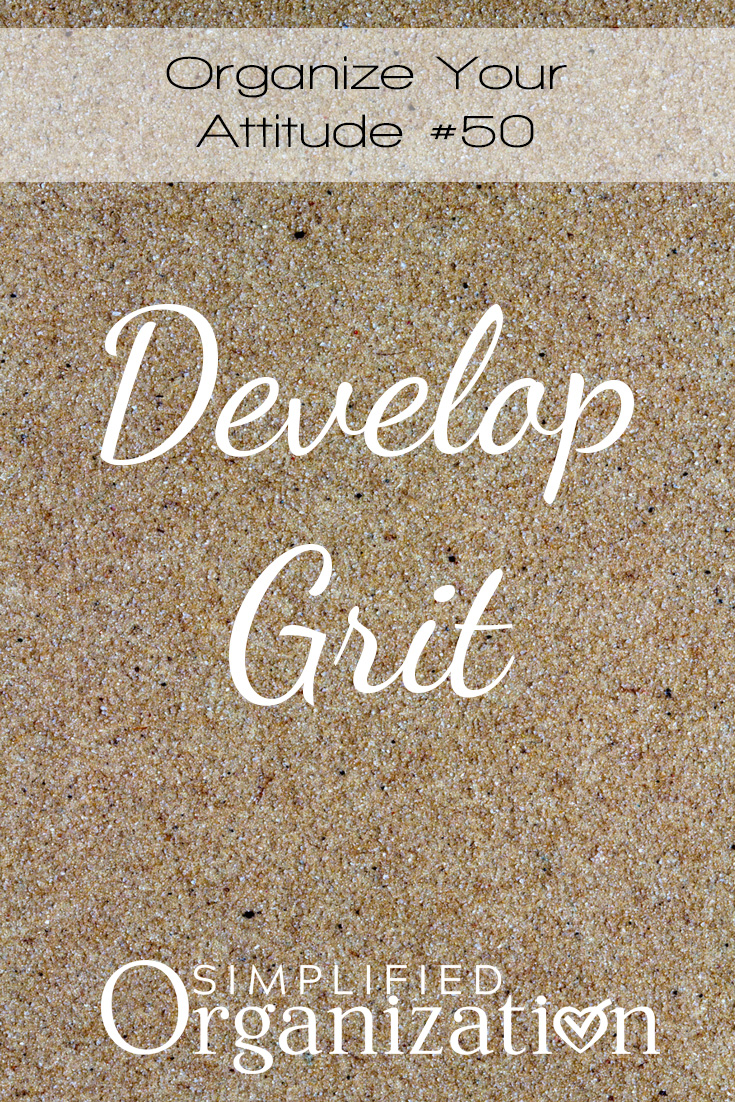
But, just because entropy affects all of life and just because God’s goal isn’t our material comfort or physical ease doesn’t mean we shouldn’t bother being organized.
It just means we have to know what real organization is.
It’s about being prepared – not only in our physical surroundings and supplies – but also in our minds. We need to be prepared to accept life as it comes, to roll with the punches and adjust based on current needs rather than desired outcomes.
We might have desired outcomes, but sometimes they need to be put on hold and sometimes they need to be canceled.
Being organized takes grit because life takes grit.
The dictionary defines grit as “courage and resolve; strength of character.” The ancients called it virtue: the strength and will to do the right thing, regardless of how we feel.
Our feelings will follow. To let them lead is folly.
Grit is the ability to hold to our resolve when the going gets tough. And we need to know that the going will get tough. Just knowing what to do is never enough. We also have to actually do it – and that will, sometimes, be hard.
Another definition of grit is as a measurement of the abrasiveness of sandpaper.
It’s related.
We need grit. We need to hold fast, stand firm, push forward.
We also need grit – we need sandpaper to smooth our rough edges, to show us where our hearts are hard and our minds are weak. Difficulties – whether real or those that are all in our heads – are either grit in our mouths making life taste bitter or they are grit rubbing us smooth. It might not be pleasant, but it is good.
Let us hold fast to virtue with grit and endurance and stamina.
Let us hold fast through trial and temptation, seeing the grit it brings as a hidden mercy.
51. Cultivate friendships.
A too-oft overlooked way to brighten our attitudes and get them back on target is to talk to a friend.
We are not meant to live isolated lives. We are created to live in families and in church communities. The New Testament says we are like one body with our fellow believers, and we cannot say we have no need of them.
Friendships take time investment. But they are worth it. When we know we are not alone, we’re encouraged even when we aren’t with our friends. When we know we have someone who understands, who will listen, the burden of the daily grind is lifted.
The friendship matters, of course. It’s easy to find women friends who think friendship is for mutual complaining and gossip. What you hear and speak with your friends will shape your attitude and your inner thought conversation with yourself.
Find friends who will point you back to the path, back to Christ, back to cheerful obedience. Be a friend who will do that for others.
Cultivating friendships takes time.
We have probably all experienced losing friends from lack of contact. Whether it’s because they move away or our lives grow apart, it’s easy to lose touch.
It takes time and perseverance to keep up with friends – and we can’t keep up close friendships with everyone we meet. But we should choose 3-5 women who build us up and keep us on track and make a steady effort to send a text, make a call, write an email, plan a visit. Put it on your recurring task list. Add them to your prayer list.
Investing our time in friendships that uplift is worth it.
Cultivating friendships takes humility.
No matter how much we might feel alike at first, a friend is a different person than ourselves. Our friendship cannot be based on how similar we are or it will be doomed. It might be based on a likeminded faith to last.
A friend will be bound to show us what we lack and how we fall short. We will fail them, they will fail us, we will disagree and we will misunderstand.
Humility and kindness will keep us close through inevitable difficulties. It’s not about us, it’s about a commitment to loving each other.
God uses friends to show us our blind spots. This is a good thing. Let us pray for it and thank Him for it, letting go of our pride and self-centeredness in our friendships.
Cultivate those friendships that point you back to trust in Christ and commitment to obedience and perseverance, and your attitude will be the richer and better for it.
52. Declutter your head.
One thing that’s bound to make us snippy and snappy is when our heads are full of details and demands. When we try to keep track of information and appointments and obligations and everything else going on in our life all in our heads, there’s not room for listening to the people in front of us and being present with them. So we snap, because our heads are stuffed.
Our minds are for thinking, responding, attending. They are not for reminding, holding, remembering.
When our minds are overfull and we can’t calmly pay attention anymore, it’s time for a brain dump.
Keeping a brain dump notebook at hand as a habit can do much to quell the rising panic feeling that comes when all the details of all the things start beating down.
It’s an attitude management strategy that is cheap, fast, and it works.
Start a list of everything that is on your mind, everything that is not as it should be. Yes, everything. You want the paper to hold your anxieties, pressure points, reminders, tasks – as much as paper can hold – so that your mind lets go of them. If your mind can stop holding information, it will be free to do what it does better: pay attention and think. That’s what you want to use your mind for. Use paper to hold data, reminders, and concerns. You can only feel good about what you’re not doing when you know what you’re not doing and actively choose to delete or ignore it. So begin by gathering everything that nags you by jotting it down.
Later, you can filter that information and put it in the appropriate place in your planning set up, but the important first step is to just get it out of your head so the sanity can return.
Even if you’ve done a big, thorough brain dump before, that doesn’t mean you’re done with it. A brain dump is a strategy to return to again and again, whenever you start a big new project or whenever you start to feel like life is a bit too much.
Keep a notebook or scrap paper close at hand, and write down all the details, information, and ideas that come your way. You’ll feel less like you’re drowning if you keep it all written down on paper than if you try to keep it in your head, even if you don’t turn it into a perfectly organized system.
When you take some time over the course of a week or so and just start jotting down everything that’s on your mind, you’ll start clearing mental space so you can think about what’s on your mind instead of merely having the bits of information and pressure be tossed around in a jumble.
Depressurize your state of mind with a brain dump.
So, why organize your attitude?
Do you find you are the biggest problem in your own organization attempts? You have a good plan, but you don’t do it? You know what you ought to do, but you do anything else first?
You and me both, as well as everyone else who is honest. We are our own biggest problem because we are sinful. We are weak. We make bad choices all the time.
“Encouragement” that says “you can do it!” “you’re enough” or “it’s ok” is just false comfort and not helpful.
You and I can’t be perfect, which is what we’re trying to be. You and I are not enough to manage even a home, much less lives. You and I are not ok.
That’s why we need a Savior. Organization, our own effort, or time management are not saviors. If Jesus is your Savior, then every time you realize you messed up and every time you realized you’re inadequate – which is going to be all day, every day – you can turn to Him. Real turning to Christ is repentance: not asking for acceptance just as you are, but asking for more and more conformity to His will instead of your own. Forgiveness and grace follow, guaranteed – then rejoicing and obedience and gratitude.
Pursued with repentance and gratitude, organization looks like service, not perfectly matching labeled containers.
PS – If Jesus is not your Savior, then your hunt for perfection and peace will continue unsatisfied. Email me if you want to know more.
Dump all those swirling thoughts out of your head.
Yes, simply writing it all down will help to
- Reduce stress by getting your thoughts onto paper
- Reduce frustration by assigning homes to stuff, tangible & intangible
- Reduce anxiety by knowing what you have on your plate
